- Article Writing
- Article On The Importance Of Education

Article on the Importance of Education
Are you educated? Do you think education is a waste of time? This article on the importance of education will give you the answer to that question.
Table of Contents
What can be considered good education, the power of being educated.
- How Can Your Education Benefit Your Society
- FAQs on the Importance of Education
To put it in simple terms, education is the process of acquiring knowledge and skills, building morals, values, and developing habits. Education does not just consist of these. The process of education can be said to be complete only if you are able to put the knowledge you acquire to good use. So, education is not just gaining knowledge and gathering information but developing the ability to apply what you have learned to daily life scenarios.
Is there good education and bad education? This is a question that has been asked for years now. Good education works towards the goal of preparing and empowering individuals to lead a productive life that definitely impacts the economic growth of the society and country they are a part of. Good education is meant to stimulate logical and critical thinking in individuals. Good education does not mean scoring high marks in your assessments. People usually perceive the notion that schooling and scoring good marks in examinations is education. Education is beyond all that. Schooling alone does not lead to learning. Getting a good education depends on a lot of factors, including the environment or society you are in, the social and economic background and the ability of the individual to understand, analyse and act according to the need of the hour.
It is a fact that quality education and skill development comes from strong education systems. Having trained and empathetic teachers is one of the prerequisites to availing good education. Education includes learning about different cultures, religions, communities, economic and social standards and grooming oneself to become a socially responsible individual. With the advancement of technology, teachers have been taken for granted because most children nowadays have their own mobile phones and internet access with which they can find answers to any questions, sometimes questions their parents, siblings, or teachers cannot explain. This is a huge drawback in the process of building a healthy society.
Being educated often makes you feel powerful. Why is that?
Imagine you did not know how to use a mobile phone, a laptop, a match stick or a bulb. What is the use of possessing something that you do not know how to use? In the beginning of time, it was found out that hitting two rocks together produces sparks that can start a fire. Every little thing you come across can teach you something or the other. The more you know, the more powerful you become.
Knowing how to drive a car would come in handy when you have to go somewhere with more people travelling with you. Knowing how to fix a pipe can help you when someone accidentally breaks off a pipe and water keeps flowing. Likewise, everything you learn will help you in one or the other way. Therefore, good education can be defined as the general and specific knowledge people gain by being taught or by experience.
“Education is not the learning of facts, but the training of the mind to think”, according to Albert Einstein. Gathering a load of information is easily possible in the present age of the internet and technology. Being able to answer every question does not guarantee or prepare you for a life where experience and knowledge is accounted for.
How Can Your Education Benefit Your Society?
Society is an integral part of every nation. The growth and development of individuals help the betterment of the society they are a part of, which in turn helps the social and economic progress of the nation as a whole. The education system has been evolving from day one. The modes and means of education are improvised every now and then according to the changing times.
According to Benjamin Franklin, “An investment in knowledge pays the best interest”. Any amount of money or time spent on getting yourself educated never goes to waste. The more you learn, the more you benefit from it. Even if you think that something that you are learning is not what you are interested in or what you think you need, do not worry because everything you come across will help you in some stage of life. An educated individual has a lot more to give to a society and a nation than a rich person. Being educated shapes the characters and social behaviours of individuals. It changes the way people think and act. The way you look at your fellow beings and treat them varies with every day in the process of learning.
The ultimate goal of education should be action and not just knowledge. In order to attain this goal, it is important to let all kinds of people understand the importance of education and the benefits of being educated in this constantly changing world.
Frequently Asked Questions on the Importance of Education
Why is education important.
Education makes you a better person and gives you stability in life. You become a person people around you can rely on. You can become the hand that lifts up the lowly and provides solutions to all the problems they face. It can also boost your self-confidence and credibility as an individual.
What is the purpose of education?
The purpose of education is to help the development of an individual’s intellectual and emotional self. Education shapes the individual’s character and attitude towards life and fellow beings. It aims to promote the overall development of the individual’s personality.
Is education compulsory?
Most countries have the principle of providing free and compulsory education to all. In India, Article 21 A of the Constitution states that all children from ages six to fourteen should be provided with free and compulsory education and also reserves the right to education as a Fundamental Right.
Leave a Comment Cancel reply
Your Mobile number and Email id will not be published. Required fields are marked *
Request OTP on Voice Call
Post My Comment
Register with BYJU'S & Download Free PDFs
Register with byju's & watch live videos.
- Our Mission
What Is Education For?
Read an excerpt from a new book by Sir Ken Robinson and Kate Robinson, which calls for redesigning education for the future.

What is education for? As it happens, people differ sharply on this question. It is what is known as an “essentially contested concept.” Like “democracy” and “justice,” “education” means different things to different people. Various factors can contribute to a person’s understanding of the purpose of education, including their background and circumstances. It is also inflected by how they view related issues such as ethnicity, gender, and social class. Still, not having an agreed-upon definition of education doesn’t mean we can’t discuss it or do anything about it.
We just need to be clear on terms. There are a few terms that are often confused or used interchangeably—“learning,” “education,” “training,” and “school”—but there are important differences between them. Learning is the process of acquiring new skills and understanding. Education is an organized system of learning. Training is a type of education that is focused on learning specific skills. A school is a community of learners: a group that comes together to learn with and from each other. It is vital that we differentiate these terms: children love to learn, they do it naturally; many have a hard time with education, and some have big problems with school.

There are many assumptions of compulsory education. One is that young people need to know, understand, and be able to do certain things that they most likely would not if they were left to their own devices. What these things are and how best to ensure students learn them are complicated and often controversial issues. Another assumption is that compulsory education is a preparation for what will come afterward, like getting a good job or going on to higher education.
So, what does it mean to be educated now? Well, I believe that education should expand our consciousness, capabilities, sensitivities, and cultural understanding. It should enlarge our worldview. As we all live in two worlds—the world within you that exists only because you do, and the world around you—the core purpose of education is to enable students to understand both worlds. In today’s climate, there is also a new and urgent challenge: to provide forms of education that engage young people with the global-economic issues of environmental well-being.
This core purpose of education can be broken down into four basic purposes.
Education should enable young people to engage with the world within them as well as the world around them. In Western cultures, there is a firm distinction between the two worlds, between thinking and feeling, objectivity and subjectivity. This distinction is misguided. There is a deep correlation between our experience of the world around us and how we feel. As we explored in the previous chapters, all individuals have unique strengths and weaknesses, outlooks and personalities. Students do not come in standard physical shapes, nor do their abilities and personalities. They all have their own aptitudes and dispositions and different ways of understanding things. Education is therefore deeply personal. It is about cultivating the minds and hearts of living people. Engaging them as individuals is at the heart of raising achievement.
The Universal Declaration of Human Rights emphasizes that “All human beings are born free and equal in dignity and rights,” and that “Education shall be directed to the full development of the human personality and to the strengthening of respect for human rights and fundamental freedoms.” Many of the deepest problems in current systems of education result from losing sight of this basic principle.
Schools should enable students to understand their own cultures and to respect the diversity of others. There are various definitions of culture, but in this context the most appropriate is “the values and forms of behavior that characterize different social groups.” To put it more bluntly, it is “the way we do things around here.” Education is one of the ways that communities pass on their values from one generation to the next. For some, education is a way of preserving a culture against outside influences. For others, it is a way of promoting cultural tolerance. As the world becomes more crowded and connected, it is becoming more complex culturally. Living respectfully with diversity is not just an ethical choice, it is a practical imperative.
There should be three cultural priorities for schools: to help students understand their own cultures, to understand other cultures, and to promote a sense of cultural tolerance and coexistence. The lives of all communities can be hugely enriched by celebrating their own cultures and the practices and traditions of other cultures.
Education should enable students to become economically responsible and independent. This is one of the reasons governments take such a keen interest in education: they know that an educated workforce is essential to creating economic prosperity. Leaders of the Industrial Revolution knew that education was critical to creating the types of workforce they required, too. But the world of work has changed so profoundly since then, and continues to do so at an ever-quickening pace. We know that many of the jobs of previous decades are disappearing and being rapidly replaced by contemporary counterparts. It is almost impossible to predict the direction of advancing technologies, and where they will take us.
How can schools prepare students to navigate this ever-changing economic landscape? They must connect students with their unique talents and interests, dissolve the division between academic and vocational programs, and foster practical partnerships between schools and the world of work, so that young people can experience working environments as part of their education, not simply when it is time for them to enter the labor market.
Education should enable young people to become active and compassionate citizens. We live in densely woven social systems. The benefits we derive from them depend on our working together to sustain them. The empowerment of individuals has to be balanced by practicing the values and responsibilities of collective life, and of democracy in particular. Our freedoms in democratic societies are not automatic. They come from centuries of struggle against tyranny and autocracy and those who foment sectarianism, hatred, and fear. Those struggles are far from over. As John Dewey observed, “Democracy has to be born anew every generation, and education is its midwife.”
For a democratic society to function, it depends upon the majority of its people to be active within the democratic process. In many democracies, this is increasingly not the case. Schools should engage students in becoming active, and proactive, democratic participants. An academic civics course will scratch the surface, but to nurture a deeply rooted respect for democracy, it is essential to give young people real-life democratic experiences long before they come of age to vote.
Eight Core Competencies
The conventional curriculum is based on a collection of separate subjects. These are prioritized according to beliefs around the limited understanding of intelligence we discussed in the previous chapter, as well as what is deemed to be important later in life. The idea of “subjects” suggests that each subject, whether mathematics, science, art, or language, stands completely separate from all the other subjects. This is problematic. Mathematics, for example, is not defined only by propositional knowledge; it is a combination of types of knowledge, including concepts, processes, and methods as well as propositional knowledge. This is also true of science, art, and languages, and of all other subjects. It is therefore much more useful to focus on the concept of disciplines rather than subjects.
Disciplines are fluid; they constantly merge and collaborate. In focusing on disciplines rather than subjects we can also explore the concept of interdisciplinary learning. This is a much more holistic approach that mirrors real life more closely—it is rare that activities outside of school are as clearly segregated as conventional curriculums suggest. A journalist writing an article, for example, must be able to call upon skills of conversation, deductive reasoning, literacy, and social sciences. A surgeon must understand the academic concept of the patient’s condition, as well as the practical application of the appropriate procedure. At least, we would certainly hope this is the case should we find ourselves being wheeled into surgery.
The concept of disciplines brings us to a better starting point when planning the curriculum, which is to ask what students should know and be able to do as a result of their education. The four purposes above suggest eight core competencies that, if properly integrated into education, will equip students who leave school to engage in the economic, cultural, social, and personal challenges they will inevitably face in their lives. These competencies are curiosity, creativity, criticism, communication, collaboration, compassion, composure, and citizenship. Rather than be triggered by age, they should be interwoven from the beginning of a student’s educational journey and nurtured throughout.
From Imagine If: Creating a Future for Us All by Sir Ken Robinson, Ph.D and Kate Robinson, published by Penguin Books, an imprint of Penguin Publishing Group, a division of Penguin Random House, LLC. Copyright © 2022 by the Estate of Sir Kenneth Robinson and Kate Robinson.
- Current Students
- Faculty / Staff
- Paying for College
- Alumni Services
- Program Finder
- Affordable, Flexible, Accessible
- Distance Education
- All Online Courses & Degrees
- Baccalaureate Online
- Graduate Online
- Start Dates
- Admissions, Costs & Aid
- Partnerships
- Faculty and Contacts
- Academic and Career Support
- Student Testimonials
- Distance Education Advantage
- In-Person Education
- About Hybrid Learning
- Hybrid Learning Degrees
- Student Life
- Academic Support
- Academic Calendar
- Faculty & Contacts
- Technical Institute for Environmental Professions
- Term Calendar
- Sustainable Ventures
- Careers & Outcomes
- About Unity
- Office of the President
- Announcing Our Evolution
- Sustainable Achievements & Initiatives
- Reinventing College
- Extended Reality (XR)
- Commencement
- Give to Unity Environmental University
- Institutional Communications
- Unity Environmental University News

Home / News / Why Is Education Important? The Power Of An Educated Society

Why Is Education Important? The Power Of An Educated Society
Looking for an answer to the question of why is education important? We address this query with a focus on how education can transform society through the way we interact with our environment.
Whether you are a student, a parent, or someone who values educational attainment, you may be wondering how education can provide quality life to a society beyond the obvious answer of acquiring knowledge and economic growth. Continue reading as we discuss the importance of education not just for individuals but for society as a whole.

Harness the power of education to build a more sustainable modern society with a degree from Unity Environmental University .
How Education Is Power: The Importance Of Education In Society
Why is education so important? Nelson Mandela famously said, “Education is the most powerful weapon which you can use to change the world.” An educated society is better equipped to tackle the challenges that face modern America, including:
- Climate change
- Social justice
- Economic inequality
Education is not just about learning to read and do math operations. Of course, gaining knowledge and practical skills is part of it, but education is also about values and critical thinking. It’s about finding our place in society in a meaningful way.
Environmental Stewardship
A study from 2022 found that people who belong to an environmental stewardship organization, such as the Leave No Trace Center for Outdoor Ethics, are likely to have a higher education level than those who do not. This suggests that quality education can foster a sense of responsibility towards the environment.
With the effects of climate change becoming increasingly alarming, this particular importance of education is vital to the health, safety, and longevity of our society. Higher learning institutions can further encourage environmental stewardship by adopting a framework of sustainability science .

The Economic Benefits Of Education
Higher education can lead to better job opportunities and higher income. On average, a person with a bachelor’s degree will make $765,000 more in their lifetime than someone with no degree. Even with the rising costs of tuition, investment in higher education pays off in the long run. In 2020, the return on investment (ROI) for a college degree was estimated to be 13.5% to 35.9% .
Green jobs like environmental science technicians and solar panel installers have high demand projections for the next decade. Therefore, degrees that will prepare you for one of these careers will likely yield a high ROI. And, many of these jobs only require an associate’s degree or certificate , which means lower overall education costs.
Unity helps students maximize their ROI with real-world experience in the field as an integral part of every degree program.
10 Reasons Why School Is Important
Education is not just an individual pursuit but also a societal one. In compiling these reasons, we focused on the question, “How does education benefit society?” Overall, higher education has the power to transform:
- Individuals’ sense of self
- Interpersonal relationships
- Social communities
- Professional communities
Cognitive Development
Neuroscience research has proven that the brain is a muscle that can retain its neuroplasticity throughout life. However, like other muscles, it must receive continual exercise to remain strong. Higher education allows people of any age to improve their higher-level cognitive abilities like problem-solving and decision-making. This can make many parts of life feel more manageable and help society run smoothly.
Emotional Intelligence
Emotional intelligence is key to workplace success. Studies show that people with emotional intelligence exhibit more:
- Self-awareness
- Willingness to try new things
- Innovative thinking
- Active listening
- Collaboration skills
- Problem-solving abilities
By attending higher education institutions that value these soft skills, students can improve their emotional intelligence as part of their career development in college.
Technological Literacy
Many careers in today’s job market use advanced technology. To prepare for these jobs, young people likely won’t have access to these technologies to practice on their own. That’s part of why so many STEM career paths require degrees. It’s essential to gain technical knowledge and skills through a certified program to safely use certain technologies. And, educated scientists are more likely to make new technological discoveries .
Cultural Awareness
Education exposes individuals to different cultures and perspectives. Being around people who are different has the powerful ability to foster acceptance. Acceptance benefits society as a whole. It increases innovation and empathy.
College also gives students an opportunity to practice feeling comfortable in situations where there are people of different races, genders, sexualities, and abilities. Students can gain an understanding of how to act respectfully among different types of people, which is an important skill for the workplace. This will only become more vital as our world continues to become more globalized.
Ethical and Moral Development
Another reason why school is important is that it promotes ethical and moral development. Many schools require students to take an ethics course in their general education curriculum. However, schools can also encourage character development throughout their programs by using effective pedagogical strategies including:
- Class debates and discussions
- Historical case studies
- Group projects
Unity’s distance learning programs include an ethical decision-making class in our core curriculum.

Ready To Learn More About Unity Environmental University?
Communication Skills
Effective written and verbal communication skills are key for personal and professional success. Higher education programs usually include at least one communication course in their general education requirements. Often the focus in these classes is on writing skills, but students can also use college as an opportunity to hone their presentation and public speaking skills. Courses such as Multimedia Communication for Environmental Professionals provide many opportunities for this.
Civic Engagement
According to a Gallup survey , people with higher education degrees are:
- More likely to participate in civic activities such as voting and volunteering
- Less likely to commit crimes
- More likely to get involved in their local communities
All these individual acts add up to make a big difference in society. An educated electorate is less likely to be swayed by unethical politicians and, instead, make choices that benefit themselves and their community. Because they are more involved, they are also more likely to hold elected officials accountable.
Financial Stability
The right degree can significantly expand your career opportunities and improve your long-term earning potential. Not all degrees provide the same level of financial stability, so it’s important to research expected salary offers after graduation and job demand outlook predictions for your desired field. Consider the return on investment for a degree from an affordable private school such as Unity Environmental University .
Environmental Awareness
We have already discussed why education is important for environmental stewardship. Education can also lead to better environmental practices in the business world. By building empathy through character education and ethics courses, institutions can train future business leaders to emphasize human rights and sustainability over profits. All types and sizes of businesses can incorporate sustainable practices, but awareness of the issues and solutions is the first step.
Lifelong Learning
The reasons why education is important discussed so far focus on institutional education. However, education can happen anywhere. Attending a university that values all kinds of learning will set students up with the foundation to become lifelong learners. Research demonstrates that lifelong learners tend to be healthier and more fulfilled throughout their lives. When societies emphasize the importance of education, they can boost their overall prosperity.

The Role Of Unity Environmental University In Society
Environmentally conscious education is extremely valuable and should be accessible to all. Unity Environmental University offers tuition prices that are comparable to public universities, and financial aid is available to those who qualify. Courses last five weeks so that students can focus on only one class at a time. This ensures all learners are set up for academic success.
Unity believes in supporting students holistically to maximize the power of education. This includes mental health services, experiential learning opportunities , and job placement assistance . Students in our hybrid programs can take classes at several field stations throughout Maine and enjoy the beautiful nature surrounding the campus for outdoor recreation.
Sustainable Initiatives
Some highlights from Unity Environmental University’s many sustainable initiatives:
- All programs include at least one sustainability learning outcome
- All research courses are focused on sustainability research
- Reduced building energy use by 25% across campus
- 100% of food waste is recycled into energy
- Campus features a net-zero LEED Platinum-certified classroom/office building
While many schools value sustainability, Unity stands out because everything we do is about sustainability. We also recognize our responsibility to model how a sustainable business can operate in a manner that’s fiscally viable and socially responsible.
Make An Impact At Unity Environmental University
While the phrase ‘education is power’ may sound cliche, it is also resoundingly true. Higher education has the power to transform individuals and societies. Unity Environmental University understands its power to make a positive impact on the world. That’s why we were the first university to divest from fossil fuels.
This year, we celebrated our largest incoming class ever , showing that students want an education system that aligns with their values. In addition to our commitment to sustainability, we offer flexibility to students with start dates all year round for our online degree programs .

Start Your Journey

Looking for Answers
Get More Info
© Unity Environmental University 2024. “America’s Environmental University.™”
Privacy Overview

45,000+ students realised their study abroad dream with us. Take the first step today
Here’s your new year gift, one app for all your, study abroad needs, start your journey, track your progress, grow with the community and so much more.

Verification Code
An OTP has been sent to your registered mobile no. Please verify

Thanks for your comment !
Our team will review it before it's shown to our readers.

- Education /
Article on the Importance of Education in 100 to 350 Words
- Updated on
- Jan 9, 2024
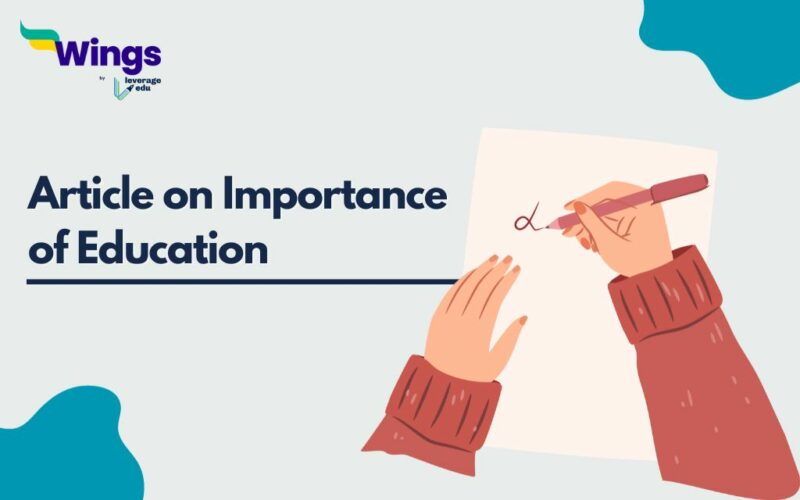
Education entails acquiring knowledge to have a greater understanding of the various disciplines that will be used in our everyday lives. ‘ Education ’ refers to the information we gain and experience outside of books or classrooms, as well as the knowledge that we receive and experience in schools, our homes, and as members of society. Our ideas on life alter as a result of learning, education is crucial for personal development and growth in society . In this blog, we will see why we need education for growth and will also look at some articles on the importance of education.
This Blog Includes:
Importance of education, mental aspect of education’s importance, the power of being an educated individual, how can your education benefit your society, articles on importance of education, article on importance of education: 100 words, article on importance of education: 200 words, article on importance of education: 350 words, article on importance of women’s education.
Also Read: Essay On Education System
Also Read: Importance of Education in Development
The value of education at a much younger age. Our first tryst with learning begins at home, and our first teachers are our parents, grandparents, and often siblings. The importance of education lies in its continuity, learning is a lifetime process that will stop with our death. It is the foundation for the development of a healthy individual and society. Our world cannot have a bright future if our culture lacks education.
Education is the key to change. It is an important tool that allows a person to understand his or her rights and responsibilities to his or her family, society, and nation. It improves a person’s ability to view the world and to fight against misdoings such as injustice, corruption, and violence, among other things.
Education is meant to hone talent, sharpen our mindsets and educate us on a myriad of things. In school, we cover a variety of topics such as history, arithmetic, geography, politics, and so on. These subjects sharpen children’s minds and allow the kid to absorb knowledge from all subjects, and his or her mental level is increased. Here are some cognitive benefits of learning and education that ensure growth and development in children:
Education’s importance in our lives provides us with stability in our everyday lives. Everything may be split, but not your education, you must be told. You can improve your chances of getting a better job with the aid of your degree and expertise.
Financial Security
Our financial stability is helped by education. Higher-qualified individuals receive higher-paying employment in this era, allowing them to guarantee their future.
Self-dependency
Education teaches us to be self-sufficient in our daily lives. A person’s education is his alone, and with it, he may feel safe and self-sufficient.
Equality is a right that everyone deserves. If everyone had the opportunity to pursue higher education, there would be a greater likelihood that everyone would earn a large sum of money, and there would be fewer disparities across social classes. It aids in the pursuit of equality.
Confidence is one of the finest aspects of success. Education boosts a person’s self-assurance. You can go further into a topic that you are already familiar with. With the information you’ve obtained through your schooling, you can converse about that issue far better than others.
If you are a Class 12 student, here are some important blogs for you:
Knowledge and education is power. Education enables individuals. Enables them to innovate, understand, adapt, and overcome. Everything we learn helps us in life in one way or the other. It helps make our life convenient and easy. Good education is basically the knowledge that gives people perspective and information about things which can range from being as simple as fixing a water pipe to building a rocket destined for moon. When we are educated, we can adapt to each and every aspect of life better and it also helps us overcome many hurdle of life and gives perspective about a lot things such as finance, planning, etc. All this can make any individual feel powerful because there remains nothing in life that they cannot tackle.
Every nation’s integral part is it’s society and the growth an development of the same is dependent upon the individuals which in turn helps the social and economic progress of the nation. The education system has been evolving from the very first day and now it has several mods and means of the same. It is quite correct to say that any amount or money spent of being educated never goes waste. The more you learn, the you will be able to grow in life. Every aspect of education will one way or the other, help you in your life. And when an individual is educated, he/she can significantly contribute to the growth of the society and the nation, much more than a rich person. Education helps develop characters, personalities and social behaviours. It helps shape the way people think and act. An ultimately it lead to how a society will grow. For this to happen, it is essential that all of the people understand the importance of education.
The process of learning and increasing abilities through courses, literature, training and other mediums is known as education. It assists us in developing our talents and seeking employment to suit our requirements and obligations.
Education is vital to one’s success in life. It is essential for an individual’s entire growth. The process of learning and improving one’s skills is referred to as education. Wisdom and the ability to handle challenges come with knowledge. Education enhances one’s quality of life while also granting social recognition. Though education is essential for everyone, the need for it is most acute during childhood. Starting with children under the age of 10, school education is critical. It serves as a solid basis for their life skills and goals. A person who lacks education is powerless and vulnerable. H/She will find it difficult to deal with life’s challenges.
Related Reads:
Education is a valuable tool for gaining learning and wisdom. Though books are essential to education, the notion encompasses more than just books and bookish knowledge. It isn’t required for education to be only based on books.
The most important goal of education is to help people with how to read and write. The first step toward literacy is reading and writing. Education provides a person with endless opportunities for growth and advancement. People who have had an education tend to be more calm and self-assured. People who have been educated are disciplined and understand the importance of time. Education allows a person to be more expressive and opinionated. H/She was able to readily communicate his/her viewpoints, which were supported by a clear aim and rationale.
Education benefits not just the individual but also the community. The most important aspect of education is that it goes from one individual to another, then throughout society, and eventually throughout the country. An educated individual makes an effort to teach and inspire everyone with whom he or she comes into contact. Education brings one up to speed on technological advancements as well. A well-educated person can easily adjust to technological developments. Education, more than anything else, is a source of hope. The desire for a better life; the desire for a wealthy and poverty-free existence.
Must Read: Importance of School Education
Human education is a critical instrument in their lives. It is a significant distinction between a civilized and an undisciplined individual. Even if the country’s literacy rate has increased in recent years, more individuals need to be made aware of the importance of education. Every child, whether a male or a girl, must attend school and not drop out. Education is beneficial not just to the individual but also to society. A well-educated individual is a valuable asset to society, contributing to its social and economic development. Such a person is always willing to assist society and the country. It is true to say that education is a stairway to a person’s and a nation’s achievement.
Education makes a person productive, allowing him or her to contribute to society in a positive way. It teaches us how to face many challenges and conquer them. A well-educated individual understands how to act in a polite and non-offensive manner. It shows us how to live a disciplined life while yet making a respectable living. Our future is built on the basis of education. Education is also the sole weapon that may be used to combat numerous issues such as illiteracy, poverty, unemployment, and so on. A person’s education makes them more sensitive to the predicament of their fellow beings. A well-educated individual not only comprehends the issues but also possesses the essential abilities to address them.
An educated individual possesses competent skills and is more capable than someone who is uneducated. However, it is incorrect to think that education alone ensures success. Indeed, success necessitates a solid education, as well as devotion, attention, and hard effort. An educated individual is more sensible and capable of rational thought.
Education allows a person to become self-sufficient. An educated individual does not rely on others and is capable of meeting his or her own requirements. A well-educated person also educates their family, and education benefits, not just the individual but also society and the nation. Education has a significant influence on our outlook, making us more optimistic about life and its objectives.
Also Read: Importance of Education in Child’s Life
There was a period when it was considered that women didn’t need to be educated. We’ve now realized the importance of women’s education . The modern era is the phase of women’s awakening. In every aspect of life, women are striving to compete with males. Many individuals reject female education, claiming that women’s rightful domain is the home, and therefore that money spent on female education is squandered. This viewpoint is incorrect since female education has the potential to bring about a silent revolution in society.
Female education has numerous advantages; educated women may contribute significantly to the country’s growth by sharing the burdens of males in several fields. They may contribute to society as teachers, lawyers, physicians, and administrators, as well as play a key part in wartime. In this time of economic distress, education is a blessing for women. The days of wealth and prosperity are long gone. Middle-class families are finding it increasingly difficult to make ends meet these days. Female education is important for a country’s growth, thus it should be supported.
Everyone has hope for a better life if they have an education. It’s a type of magic that works in a person’s life to make it far better than it would be if he didn’t have knowledge. To sum up the blog, we believe that everyone should be educated so that they can contribute to making our country proud. Increasing literacy rates can prevent tens of thousands of crimes. Every country should encourage its citizens to receive an education.
Also Read: Importance of Education for Growth and Betterment
Related Articles
Education is a valuable tool for gaining learning and wisdom. Though books are essential to education, the notion encompasses more than just books and bookish knowledge. It isn’t required for education to be only based on books. The most important goal of education is to help people with how to read and write. The first step toward literacy is reading and writing. Education provides a person with endless opportunities for growth and advancement.
Education teaches us the importance of teamwork, communication, and interpersonal relationships. Education plays an important role in building intellectual and mental development. Education enhances creativity and allows us to express ourselves through various mediums and discover our unique talents. Education serves as a powerful tool for breaking the cycle of poverty
Moral education teaches us important values such as Respect, honesty, compassion, hard work, kindness, gratitude, sharing, cooperation, etc.
This was all about articles on the importance of education! We hope the information provided was helpful! For more information on such informative topics for your school, visit our school education page and follow Leverage Edu .
Team Leverage Edu
Leave a Reply Cancel reply
Save my name, email, and website in this browser for the next time I comment.
Contact no. *

Leaving already?
8 Universities with higher ROI than IITs and IIMs
Grab this one-time opportunity to download this ebook
Connect With Us
45,000+ students realised their study abroad dream with us. take the first step today..

Resend OTP in

Need help with?
Study abroad.
UK, Canada, US & More
IELTS, GRE, GMAT & More
Scholarship, Loans & Forex
Country Preference
New Zealand
Which English test are you planning to take?
Which academic test are you planning to take.
Not Sure yet
When are you planning to take the exam?
Already booked my exam slot
Within 2 Months
Want to learn about the test
Which Degree do you wish to pursue?
When do you want to start studying abroad.
September 2024
January 2025
What is your budget to study abroad?

How would you describe this article ?
Please rate this article
We would like to hear more.

Getting Into College , Tips for Online Students , Tips for Students , Why Go to College
Top 10 Reasons Why Is Education Important
Updated: February 1, 2024
Published: April 15, 2020

Most of us have grown up being taught the importance of education. But why is education important? Through your frustrating school years, you may have thought that it was a waste of time, or was just something that you needed to do in order to get a job. Truth be told, however, education goes so much beyond just getting a job and making your parents happy. In fact, it’s one of the most powerful tools out there.
What Is Education?
Education means studying in order to obtain a deeper knowledge and understanding of a variety of subjects to be applied to daily life. Education is not limited to just knowledge from books, but can also be obtained through practical experiences outside of the classroom.
Top 10 Reasons: Why Is Education Important?
There are many different understandings and definitions of what education is, but one thing can be universally agreed upon, which is the importance of education — and here’s why.
1. Provides Stability
Education provides stability in life, and it’s something that no one can ever take away from you. By being well-educated and holding a college degree , you increase your chances for better career opportunities and open up new doors for yourself.
2. Provides Financial Security
On top of stability, education also provides financial security, especially in today’s society. A good education tends to lead to a higher paying job, as well as provide you with the skills needed to get there. Educated and well-informed individuals also know how to use money-saving tactics. They are more likely to use coupon websites like EMUCoupon while shopping online to save their hard-earned money.
3. Needed For Equality
In order for the entire world to really become equal, it needs to start with education. If everyone was provided with the same opportunities to education , then there would be less gaps between social classes. Everyone would be able to have an equal chance at higher paying jobs — not just those that are already well-off.
4. Allows For Self-Dependency
The importance of education is evident when it comes to being self-dependent. If we are we educated, then it’s something that belongs to us, and only us, allowing us to rely on no one else other than ourselves. It can allow you to not only be financially independent, but also to make your own choices.
5. Make Your Dreams Come True
If you can dream it, you can achieve it. An education is the most powerful weapon you can possibly have, and with it, you can make all of your dreams come true. There are of course certain exceptions, depending on what you’re aiming for, but generally an education will take you as far as you’re willing to go.
6. A Safer World
Education is something that’s not only needed on a personal level, but also on a global level, as it’s something that keeps our world safe and makes it a more peaceful place. Education tends to teach people the difference between right and wrong, and can help people stay out of risky situations.
7. Confidence
Being self-confident is a major part of being successful in life. And what better way to gain that confidence than with an education? Your level of education is often considered a way to prove your knowledge, and it can give you the confidence to express your opinions and speak your mind.
8. A Part Of Society
In today’s society, having an education is considered a vital part of being accepted by those around you. Having an education is believed to make you a useful part of society, and can make you feel like a contributing member as well.
9. Economic Growth On A National Level
An educated society is crucial for economic growth. We need people to continue to learn and research in order to constantly stay innovative. Countries with higher literacy rates also tend to be in better economic situations. With a more educated population, more employment opportunities are opened.
10. Can Protect You
Education can protect you more than you know, not only on a financial level, but it can help prevent you from being taken advantage of by knowing how to read and write, such as knowing not to sign any bogus documents.
Photo by Pixabay from Pexels
Education is important for children.
Children are the future of our world, making education crucial for them. Their knowledge is what’s going to keep our world alive and flourishing.
At Childhood
During the childhood development stages, the importance of education is stronger than ever. It’s a time for children to learn social and mental skills that will be crucial for their growth and success in the future. Education at childhood also offers a chance for self-discovery and to learn about their unique interests.
The importance of education in our lives goes far beyond what we can read in a textbook. Education also provides childhood with knowledge such as how to produce artwork and make music. Education allows us to analyze what’s in front of us, and even learn from our mistakes.
Goal Building
By learning from a young age, children are given the chance to start building goals for themselves. Education means having the logic to set your mind to something and achieve it.
Importance Of Education In Society
For a modern society, education is of utmost importance. There are so many influences coming from all directions, and education can help us decipher what we should take as true, and what we should take with a grain of salt. Education can mold people into functional members of society with the right kinds of values.
Productivity
Education is needed for a productive society. Our population only continues to increase, and in turn, so do our needs. We need a strong and efficient workforce of educated people to provide us with the services we need for everyday life.
Why Is Education Important For a Nation?
The importance of education is seen in every aspect of life, and is especially crucial for the growth of a nation.
The Impact Education Has On The World
With education, people can become better citizens, knowing right from wrong, allowing for a better society where laws are followed. An educated nation knows about the importance of voting, doing so with the knowledge not blindly, but also having an understanding of what their party truly stands for. Education can also help people get jobs, which is what a nation thrives on.
Inspiring Quotes On What Education Truly Is
Why is education important, and what is it exactly? While every person has a different understanding of its true meaning, here are some of the most inspiring quotes by some legendary people.
- “Education is the most powerful weapon which you can use to change the world.” — Nelson Mandela
- “Education is the passport to the future, for tomorrow belongs to those who prepare for it today.” — Malcolm X
- “An investment in knowledge pays the best interest.” — Benjamin Franklin
- “Education is not preparation for life; education is life itself.” — John Dewey
What Are Some Other Reasons Why Education Is Important?
There are endless reasons why education is so important, especially since it also has endless connotations and meanings.
Mind And Body
Our mind and bodies are connected more than we know. With a powerful, well-educated mind, so too are our bodies.
We can not only know how to best take care of ourselves, but we can feel confident and good about ourselves, which will likely have a positive effect on our physical well-being . Education has even been proven to add years to our life . To be exact, each additional year of education was found to add as much as 1.7 years to our lives at the age of 35.
Personal Growth
The importance of education even extends itself to our personal growth. By constantly educating ourselves, asking questions and wanting to know more, we can move forward and achieve things we never imagined before.
Get To Know Yourself
Education can allow us to get to know ourselves better than ever. We can learn things about ourselves, whether it be through books, courses, or even consulting with a professional.
Photo by Burst from Pexels
Worldwide value.
Education is the best way to ensure a positive world value and view. Without a proper education, how else do we know what’s considered appropriate and how to behave?
While world peace may unfortunately seem like a far-fetched concept, with education we can get closer to this goal than we know. Education can teach us about our place in this world, and about our responsibility to humanity.
Teaches Values
Values are taught through education! Education exists far beyond the classroom or an exam. It’s taught at home, through what our parents and peers show us, and although not necessarily written down somewhere, such a teaching method is still a large aspect of what education entails.
Sharpens Your Thinking
Education is needed to think sharply and clearly!
Makes You Informed
Education makes you informed about the world around you, what’s going on and what kind of people are around you. Education can help you be more self-aware about your strengths and weaknesses, showing you were to shift your focus.
Logical Reasoning
When in an argument, if you aren’t well educated and don’t have your facts straight, then you aren’t likely to win. If you get upset about something, then being educated can also help you logically work through the situation and make sense of it, understanding all aspects.
Stay Focused
Education can help you stay focused and on track in the right direction by knowing what the right path is for you.
Allows For Innovation And Creativity
When it comes to being creative, in any way, shape, or form, the mind can only really reach its full potential if it’s been fed with the knowledge it needs to think outside the box.
Develop Life Skills
Education is the foundation of basic life skills and street smarts. While education might sound like a fancy technical term, it’s really everything we learn in life about how to best conduct ourselves from day to day.
Education can be the most freeing and empowering thing in the entire world!
Live Life To The Fullest
Truly living life to the fullest means being well-educated and holding a vast amount of knowledge about the world around us. It also means we continue to learn every day in all kinds of forms, whether it be from the people around us, newspapers, experiences, research, or traditional classes.
Breaks Barriers
Education breaks barriers between people, and allows people from across the globe to be empowered.
University of the People, a tuition-free , online university, is one powerful example of how education is being revolutionized – they offer students of all socio-economic backgrounds an equal chance at education.
Once upon a time, such a thing wouldn’t have been possible, but today such places like UoPeople have proven that these barriers truly can be broken through to receive higher education.
You Become Your Highest You
Education can allow you to become the best, fullest version of yourself, learning about what interests you, what you’re good at, becoming self-aware and conscious about the world around you. It can help you establish your place in this world, and feel complete.
Education In The Modern World
Education today is more important than ever before, and has reached new heights with new understandings of what it truly entails. Ask yourself “Why is education important?” and it will surely not be the same as anyone else’s answer.
While in modern society, holding a college degree is considered to be highly beneficial for a successful career and to be socially accepted, it is not the only means of education. Education is all around us in everything that we do, so use it wisely!
Related Articles
Essay on Importance of Education for Students
500 words essay on importance of education.
To say Education is important is an understatement. Education is a weapon to improve one’s life. It is probably the most important tool to change one’s life. Education for a child begins at home. It is a lifelong process that ends with death. Education certainly determines the quality of an individual’s life. Education improves one’s knowledge, skills and develops the personality and attitude. Most noteworthy, Education affects the chances of employment for people. A highly educated individual is probably very likely to get a good job. In this essay on importance of education, we will tell you about the value of education in life and society.

Importance of Education in Life
First of all, Education teaches the ability to read and write. Reading and writing is the first step in Education. Most information is done by writing. Hence, the lack of writing skill means missing out on a lot of information. Consequently, Education makes people literate.
Above all, Education is extremely important for employment. It certainly is a great opportunity to make a decent living. This is due to the skills of a high paying job that Education provides. Uneducated people are probably at a huge disadvantage when it comes to jobs. It seems like many poor people improve their lives with the help of Education.

Better Communication is yet another role in Education. Education improves and refines the speech of a person. Furthermore, individuals also improve other means of communication with Education.
Education makes an individual a better user of technology. Education certainly provides the technical skills necessary for using technology . Hence, without Education, it would probably be difficult to handle modern machines.
People become more mature with the help of Education. Sophistication enters the life of educated people. Above all, Education teaches the value of discipline to individuals. Educated people also realize the value of time much more. To educated people, time is equal to money.
Finally, Educations enables individuals to express their views efficiently. Educated individuals can explain their opinions in a clear manner. Hence, educated people are quite likely to convince people to their point of view.
Get the huge list of more than 500 Essay Topics and Ideas
Importance of Education in Society
First of all, Education helps in spreading knowledge in society. This is perhaps the most noteworthy aspect of Education. There is a quick propagation of knowledge in an educated society. Furthermore, there is a transfer of knowledge from generation to another by Education.
Education helps in the development and innovation of technology. Most noteworthy, the more the education, the more technology will spread. Important developments in war equipment, medicine , computers, take place due to Education.
Education is a ray of light in the darkness. It certainly is a hope for a good life. Education is a basic right of every Human on this Planet. To deny this right is evil. Uneducated youth is the worst thing for Humanity. Above all, the governments of all countries must ensure to spread Education.
FAQs on Essay on Importance of Education
Q.1 How Education helps in Employment?
A.1 Education helps in Employment by providing necessary skills. These skills are important for doing a high paying job.
Q.2 Mention one way in Education helps a society?
A.2 Education helps society by spreading knowledge. This certainly is one excellent contribution to Education.
Customize your course in 30 seconds
Which class are you in.

- Travelling Essay
- Picnic Essay
- Our Country Essay
- My Parents Essay
- Essay on Favourite Personality
- Essay on Memorable Day of My Life
- Essay on Knowledge is Power
- Essay on Gurpurab
- Essay on My Favourite Season
- Essay on Types of Sports
Leave a Reply Cancel reply
Your email address will not be published. Required fields are marked *
Download the App

Greater Good Science Center • Magazine • In Action • In Education
Our Best Education Articles of 2019
Looking for inspiration to start the new decade off on the right foot? Our most popular education articles of 2019 explore how children develop purpose, how we can best support our students’ mental health and social-emotional development, why we benefit from listening to each other’s stories, and more.
And…if you want to put the scientific findings from these articles into practice, check out our new website for educators, Greater Good in Education (GGIE), officially launching on February 20, 2020.
In response to our readers’ call for more practical resources for the classroom, GGIE features free research-based practices, lessons, and strategies for educators to foster their students’ and their own well-being, and for school leaders to develop positive school climates—all in the service of cultivating kinder, happier, and more equitable classrooms and schools.

If you’d like to take a deeper dive into the science behind social-emotional learning, mindfulness, and ethical development, join us for our annual Summer Institute for Educators . Applications are due February 15, 2019.
To whet your appetite, here are the 10 best education articles of 2019, based on a composite ranking of pageviews and editors’ picks.
What Are the Best Ways to Prevent Bullying in Schools? , by Diana Divecha: A new study identifies the most effective approaches to bullying prevention.
How to Help Young People Transition into Adulthood , by Betty Ray: Modern “rites of passage” can help teens prepare for an uncertain future.
Five Childhood Experiences That Lead to a More Purposeful Life , by Maryam Abdullah: Research suggests that our paths to finding purpose can be shaped by early childhood experiences.
How Colleges Today Are Supporting Students’ Mental Health , by Amy L. Eva: Colleges and universities are addressing well-being in students with new and innovative approaches.
How Understanding Your Brain Can Help You Learn , by Jill Suttie: A new book explains six keys to learning that can help anyone overcome barriers to success in school or in life.
Four Ways Schools Can Support the Whole Child , by Lisa Flook: Beyond just teaching academics, schools can foster students’ development in their relationships, identity, emotional skills, and overall well-being.

Honoring the Teacher's Heart: Well-Being Practices for School Change
Join our new online Community of Practice for educators!
How to Support Teens’ Social-Emotional Development , by Amy L. Eva: We need to appeal to teens’ need for status and respect for SEL to work in high schools.
How to Help Students with Learning Disabilities Focus on Their Strengths , by Rebecca Branstetter: We can empower students with learning disabilities with the language we use and the way we teach and guide them.
How to Become a Scientist of Your Own Emotions , by Jill Suttie: A Q&A with researcher Marc Brackett about how to cultivate emotional intelligence in ourselves and our kids.
What Happens When We Listen to Teachers’ Stories? by Amy L. Eva: Teachers of Oakland wants to change the conversation about education by humanizing teachers.
What Teens Are Actually Thankful For (video), by Jane Park: A first-grade teacher, a best friend, a parent—high schoolers share their gratitude letters with their recipients.
A Lesson in Thanks and Vulnerability (podcast): A junior high school teacher spent his life defying stereotypes about how men should express their emotions. Here he takes on a new challenge: getting his students to express gratitude.
About the Author

Amy L. Eva, Ph.D. , is the associate education director at the Greater Good Science Center. As an educational psychologist and teacher educator with over 25 years in classrooms, she currently writes, presents, and leads online courses focused on student and educator well-being, mindfulness, and courage. Her new book, Surviving Teacher Burnout: A Weekly Guide To Build Resilience, Deal with Emotional Exhaustion, and Stay Inspired in the Classroom, features 52 simple, low-lift strategies for enhancing educators’ social and emotional well-being.
You May Also Enjoy
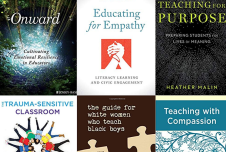
Our Favorite Books for Educators in 2018

Our Best Education Articles of 2016
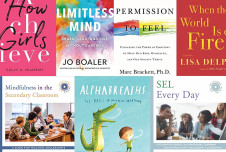
Our Favorite Books for Educators in 2019
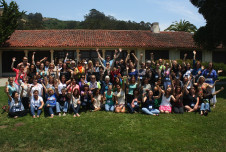
Our Best Education Articles of 2017


Our Best Education Articles of 2018

The "Why" of Education
Examining our expectations around sending children to school..
Posted August 24, 2021 | Reviewed by Ekua Hagan
- Why Education Is Important
- Find a Child Therapist
- Martin Luther King, Jr. identified "the goal of true education" to be "intelligence plus character."
- Schools that do well in terms of test scores don’t always excel at developing character in their students.
- It's important to not simplify education and to get young people's perspective on its purpose.
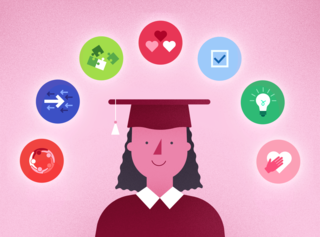
By Angela Duckworth, Ph.D.
What do we hope for when we send children to school?
This is the question Martin Luther King, Jr. posed in an essay entitled “The Purpose of Education ,” published in the Morehouse student newspaper around the time of his 18th birthday.
King’s answer: “ Intelligence plus character—that is the goal of true education.”
But what, then, is character?
This is the question child psychologist Diana Baumrind addressed, toward the end of an illustrious career , in an essay entitled “Reflections on Character and Competence.”
Character, Baumrind writes, “provides the structure of internal law that governs inner thoughts and volitions subject to the agent’s control under the jurisdiction of conscience .”
Baumrind then offers examples of character strengths recognized by diverse traditions across history and different cultures. Character is personal integrity, honesty, and social responsibility. But character is also persistence in the face of obstacles, self-discipline, and work ethic. The list of what constitutes admirable character goes on and on. In short, character is not one thing, but many.
In King’s prescient words: “The function of education, therefore, is to teach one to think intensively and to think critically. But education that stops with efficiency may prove the greatest menace to society. The most dangerous criminal may be the man gifted with reason, but with no morals.” As Baumrind put it: “It takes virtuous character to will the good, and competence to do good well.”
New research by economist Kirabo Jackson and colleagues shows that some schools are especially good at raising standardized achievement test scores. Some excel at improving interpersonal skills, like helping other people. Some improve intrapersonal skills, like setting aside time to study.
Jackson also found that the schools that do a wonderful job on the test-score front don’t always excel at developing aspects of character—and vice versa. But many schools do both.
Don’t oversimplify education. A great classroom is one in which young people thrive in every sense of the word. Schools play an essential role in helping young people develop socially, emotionally, physically, and academically.
Do ask the young people in your life what they think about the purpose of education. Share a story, perhaps, of a lesson you learned as a young person that you can’t put on your resume but hope will be remembered in your eulogy . As with so many endeavors in life, "Why?" is a very good place to start.
Angela Duckworth is the Rosa Lee and Egbert Chang Professor at the University of Pennsylvania and the author of Grit: The Power of Passion and Perseverance . She is also the co-host of the podcast No Stupid Questions .

Character Lab is a nonprofit whose mission is to advance scientific insights that help kids thrive.
- Find a Therapist
- Find a Treatment Center
- Find a Psychiatrist
- Find a Support Group
- Find Online Therapy
- United States
- Brooklyn, NY
- Chicago, IL
- Houston, TX
- Los Angeles, CA
- New York, NY
- Portland, OR
- San Diego, CA
- San Francisco, CA
- Seattle, WA
- Washington, DC
- Asperger's
- Bipolar Disorder
- Chronic Pain
- Eating Disorders
- Passive Aggression
- Personality
- Goal Setting
- Positive Psychology
- Stopping Smoking
- Low Sexual Desire
- Relationships
- Child Development
- Self Tests NEW
- Therapy Center
- Diagnosis Dictionary
- Types of Therapy

At any moment, someone’s aggravating behavior or our own bad luck can set us off on an emotional spiral that threatens to derail our entire day. Here’s how we can face our triggers with less reactivity so that we can get on with our lives.
- Emotional Intelligence
- Gaslighting
- Affective Forecasting
- Neuroscience
Why education is the key to development
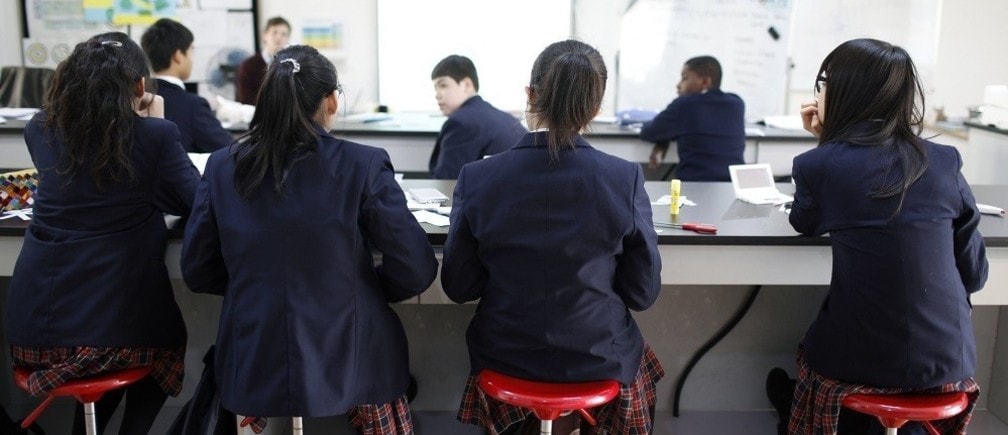
.chakra .wef-1c7l3mo{-webkit-transition:all 0.15s ease-out;transition:all 0.15s ease-out;cursor:pointer;-webkit-text-decoration:none;text-decoration:none;outline:none;color:inherit;}.chakra .wef-1c7l3mo:hover,.chakra .wef-1c7l3mo[data-hover]{-webkit-text-decoration:underline;text-decoration:underline;}.chakra .wef-1c7l3mo:focus,.chakra .wef-1c7l3mo[data-focus]{box-shadow:0 0 0 3px rgba(168,203,251,0.5);} Børge Brende

.chakra .wef-9dduvl{margin-top:16px;margin-bottom:16px;line-height:1.388;font-size:1.25rem;}@media screen and (min-width:56.5rem){.chakra .wef-9dduvl{font-size:1.125rem;}} Explore and monitor how .chakra .wef-15eoq1r{margin-top:16px;margin-bottom:16px;line-height:1.388;font-size:1.25rem;color:#F7DB5E;}@media screen and (min-width:56.5rem){.chakra .wef-15eoq1r{font-size:1.125rem;}} Infrastructure is affecting economies, industries and global issues

.chakra .wef-1nk5u5d{margin-top:16px;margin-bottom:16px;line-height:1.388;color:#2846F8;font-size:1.25rem;}@media screen and (min-width:56.5rem){.chakra .wef-1nk5u5d{font-size:1.125rem;}} Get involved with our crowdsourced digital platform to deliver impact at scale
Stay up to date:, infrastructure.
Education is a human right. And, like other human rights, it cannot be taken for granted. Across the world, 59 million children and 65 million adolescents are out of school . More than 120 million children do not complete primary education.
Behind these figures there are children and youth being denied not only a right, but opportunities: a fair chance to get a decent job, to escape poverty, to support their families, and to develop their communities. This year, decision-makers will set the priorities for global development for the next 15 years. They should make sure to place education high on the list.
The deadline for the Millennium Development Goals is fast approaching. We have a responsibility to make sure we fulfill the promise we made at the beginning of the millennium: to ensure that boys and girls everywhere complete a full course of primary schooling.
The challenge is daunting. Many of those who remain out of school are the hardest to reach, as they live in countries that are held back by conflict, disaster, and epidemics. And the last push is unlikely to be accompanied by the double-digit economic growth in some developing economies that makes it easier to expand opportunities.
Nevertheless, we can succeed. Over the last 15 years, governments and their partners have shown that political will and concerted efforts can deliver tremendous results – including halving the number of children and adolescents who are out of school. Moreover, most countries are closing in on gender parity at the primary level. Now is the time to redouble our efforts to finish what we started.
But we must not stop with primary education. In today’s knowledge-driven economies, access to quality education and the chances for development are two sides of the same coin. That is why we must also set targets for secondary education, while improving quality and learning outcomes at all levels. That is what the Sustainable Development Goal on education, which world leaders will adopt this year, aims to do.
Addressing the fact that an estimated 250 million children worldwide are not learning the basic skills they need to enter the labor market is more than a moral obligation. It amounts to an investment in sustainable growth and prosperity. For both countries and individuals, there is a direct and indisputable link between access to quality education and economic and social development.
Likewise, ensuring that girls are not kept at home when they reach puberty, but are allowed to complete education on the same footing as their male counterparts, is not just altruism; it is sound economics. Communities and countries that succeed in achieving gender parity in education will reap substantial benefits relating to health, equality, and job creation.
All countries, regardless of their national wealth, stand to gain from more and better education. According to a recent OECD report , providing every child with access to education and the skills needed to participate fully in society would boost GDP by an average 28% per year in lower-income countries and 16% per year in high-income countries for the next 80 years.
Today’s students need “twenty-first-century skills,” like critical thinking, problem solving, creativity, and digital literacy. Learners of all ages need to become familiar with new technologies and cope with rapidly changing workplaces.
According to the International Labour Organization, an additional 280 million jobs will be needed by 2019. It is vital for policymakers to ensure that the right frameworks and incentives are established so that those jobs can be created and filled. Robust education systems – underpinned by qualified, professionally trained, motivated, and well-supported teachers – will be the cornerstone of this effort.
Governments should work with parent and teacher associations, as well as the private sector and civil-society organizations, to find the best and most constructive ways to improve the quality of education. Innovation has to be harnessed, and new partnerships must be forged.
Of course, this will cost money. According to UNESCO, in order to meet our basic education targets by 2030, we must close an external annual financing gap of about $22 billion. But we have the resources necessary to deliver. What is lacking is the political will to make the needed investments.
This is the challenge that inspired Norway to invite world leaders to Oslo for a Summit on Education for Development , where we can develop strategies for mobilizing political support for increasing financing for education. For the first time in history, we are in the unique position to provide education opportunities for all, if only we pull together. We cannot miss this critical opportunity.
To be sure, the responsibility for providing citizens with a quality education rests, first and foremost, with national governments. Aid cannot replace domestic-resource mobilization. But donor countries also have an important role to play, especially in supporting least-developed countries. We must reverse the recent downward trend in development assistance for education, and leverage our assistance to attract investments from various other sources. For our part, we are in the process of doubling Norway’s financial contribution to education for development in the period 2013-2017.
Together, we need to intensify efforts to bring the poorest and hardest to reach children into the education system. Education is a right for everyone. It is a right for girls, just as it is for boys. It is a right for disabled children, just as it is for everyone else. It is a right for the 37 million out-of-school children and youth in countries affected by crises and conflicts. Education is a right regardless of where you are born and where you grow up. It is time to ensure that the right is upheld.
This article is published in collaboration with Project Syndicate . Publication does not imply endorsement of views by the World Economic Forum.
To keep up with the Agenda subscribe to our weekly newsletter .
Author: Erna Solberg is Prime Minister of Norway. Børge Brende is Norway’s Minister of Foreign Affairs.
Image: Students attend a class at the Oxford International College in Changzhou. REUTERS/Aly Song.
Share this:
- Share on Facebook (Opens in new window)
- Click to share on Twitter (Opens in new window)
- Click to share on LinkedIn (Opens in new window)
- Click to share on WhatsApp (Opens in new window)
Don't miss any update on this topic
Create a free account and access your personalized content collection with our latest publications and analyses.
License and Republishing
World Economic Forum articles may be republished in accordance with the Creative Commons Attribution-NonCommercial-NoDerivatives 4.0 International Public License, and in accordance with our Terms of Use.
The views expressed in this article are those of the author alone and not the World Economic Forum.
Related topics:
The agenda .chakra .wef-n7bacu{margin-top:16px;margin-bottom:16px;line-height:1.388;font-weight:400;} weekly.
A weekly update of the most important issues driving the global agenda
.chakra .wef-1dtnjt5{display:-webkit-box;display:-webkit-flex;display:-ms-flexbox;display:flex;-webkit-align-items:center;-webkit-box-align:center;-ms-flex-align:center;align-items:center;-webkit-flex-wrap:wrap;-ms-flex-wrap:wrap;flex-wrap:wrap;} More on Economic Growth .chakra .wef-17xejub{-webkit-flex:1;-ms-flex:1;flex:1;justify-self:stretch;-webkit-align-self:stretch;-ms-flex-item-align:stretch;align-self:stretch;} .chakra .wef-nr1rr4{display:-webkit-inline-box;display:-webkit-inline-flex;display:-ms-inline-flexbox;display:inline-flex;white-space:normal;vertical-align:middle;text-transform:uppercase;font-size:0.75rem;border-radius:0.25rem;font-weight:700;-webkit-align-items:center;-webkit-box-align:center;-ms-flex-align:center;align-items:center;line-height:1.2;-webkit-letter-spacing:1.25px;-moz-letter-spacing:1.25px;-ms-letter-spacing:1.25px;letter-spacing:1.25px;background:none;padding:0px;color:#B3B3B3;-webkit-box-decoration-break:clone;box-decoration-break:clone;-webkit-box-decoration-break:clone;}@media screen and (min-width:37.5rem){.chakra .wef-nr1rr4{font-size:0.875rem;}}@media screen and (min-width:56.5rem){.chakra .wef-nr1rr4{font-size:1rem;}} See all

Migration is a global strategic asset. We must not undermine it
Marie McAuliffe
May 29, 2024

We asked chief economists about the state of the global economy. Here's what they said

Chief economists explore geoeconomic complexities and new drivers of growth: ‘Several opportunities exist’
Spencer Feingold

'Cautious optimism': Here's what chief economists think about the state of the global economy
Aengus Collins and Kateryna Karunska

How countries are redefining their bioeconomy for the future
Faisal Khan, Megan Palmer and Matthew Chang
May 28, 2024

What is needed for inclusive and sustainable global economic growth? Four leaders share their thoughts
Liam Coleman
May 24, 2024
Transforming lives through education
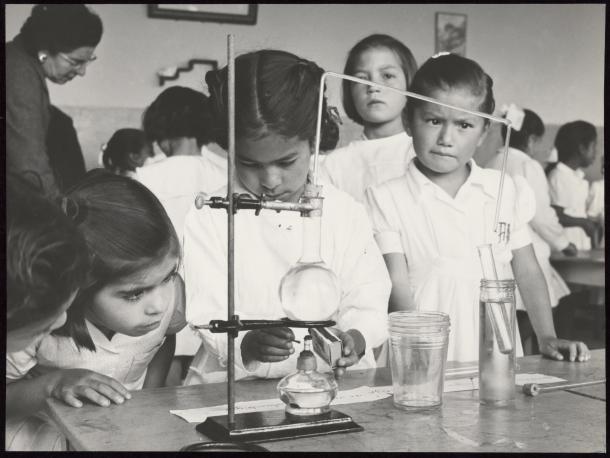
Transforming education to change our world
UNESCO provides global and regional leadership on all aspects of education from pre-school to higher education and throughout life. It works through its Member States and brings together governments, the private sector and civil society to strengthen education systems worldwide in order to deliver quality education for all. As a thought leader it publishes landmark reports and data for policy-makers, implements programmes on the ground from teacher training to emergency responses and establishes and monitors norms and standards for all to guide educational developments.
Right to education in a ruined world
Southern Italy, 1950. Three children are huddled around a makeshift desk made out of reclaimed wood, scribbling in their notebooks. The classroom has an earthen floor and roughly clad walls. The children’s clothes are ragged. They are wearing home-made slippers because shoes and the money to buy them are rare commodities in the war-ravaged south.
Although World War II ended five years earlier, the scars of conflict are still visible in this black and white photo from a report commissioned by UNESCO from legendary photojournalist David Seymour.
At the time when the photograph was taken, less than half of Italy’s population could read and write and just a third completed primary school. 70 years later, these children’s grandchildren enjoy an over 99% literacy rate. In the wake of the war, UNESCO led a major education campaign in Europe to respond to the education crisis, to rebuild links between people and to strengthen democracy and cultural identities after years of conflict. The emphasis then was on the fundamental learning skill of literacy.
Immediately after World War two UNESCO led a major education campaign in Europe to respond to the education crisis, fix and rebuild links between people and strengthen cultural identities after years of conflict. David Seymour’s images show the extent of the fight against illiteracy led by the post-war Italian government and non-governmental organisations backed by UNESCO.
Looking back at the deprived surroundings Seymour captured in his photo essay, one can see the extent of success. Seventy-one years later, those children’s grandchildren enjoy a 99.16 per cent literacy rate.
Similar programmes were held across the globe, for instance in devastated Korea where UNESCO led a major education textbook production programme in the 1950s. Several decades after, the former Secretary-General of the United Nations and Korean citizen Ban Ki-Moon expressed the importance of such a programme for the country's development:
The flowering of literacy
In a Korea devastated by war and where UNESCO led a major education textbook production programme in the 1950s, one student, Ban Ki-Moon, now Former Secretary-General of the United Nations, saw the world open up to him through the pages of a UNESCO textbook. Several decades after, he expressed the importance of such a programme for his country's development on the world stage.
Reaching the remote villages perched atop the Andes in Peru during the early 1960s wasn’t without its challenges for UNESCO’s technical assistance programme to bring literacy to disadvantaged communities. While Peru’s economy was experiencing a prolonged period of expansion, not all Peruvians were able to benefit from this growth which was limited to the industrialised coast. Instead, Andes communities were grappling with poverty, illiteracy and depopulation.
Today, the number of non-literate youths and adults around the world has decreased dramatically, while the global literacy rate for young people aged 15-24 years has reached 92 %. These astonishing successes reflect improved access to schooling for younger generations.
Photojournalist Paul Almasy has left us the poignant image of a barefoot older man while he’s deciphering a newspaper thanks to his newfound literacy skills.
The classroom at the UNESCO mission in Chinchera, in the Andean highlands of Peru, had allowed the old man to discover the world beyond his tiny village.
However, there are still huge obstacles to overcome. Data from the UNESCO Institute for Statistics shows that 617 million children and adolescents worldwide are not achieving minimum proficiency levels in reading and mathematics. Since the adoption of the Sustainable Development Goals in 2015 it is still the case that globally more than 450 million children - six out of 10 - have failed to gain basic literacy skills by the age of 10. And beyond literacy programmes, massive investments in skills for work and life, teacher training, and education policies are needed in a world that is changing ever faster.
Global priorities
Africa, home to the world’s youngest population, is not on track to achieve the targets of SDG 4. Sub-Saharan Africa alone is expected to account for 25% of the school-age population by 2030, up from 12% in 1990, yet it remains the region with the highest out-of-school rates. Girls are more likely to be permanently excluded from education than boys. The COVID-19 pandemic exacerbated inequalities, with 89% of learners not having access to computers and 82% lacking internet access to benefit from distance learning. The lack of trained teachers further jeopardizes progress towards SDG4: pre-pandemic only 64% of whom were trained at the primary level and 58% at the lower secondary level.
As part of its Priority Africa Flagship 2022 – 2029 , UNESCO has launched Campus Africa: Reinforcing Higher Education in Africa with the objective to build integrated, inclusive, and quality tertiary education systems and institutions, for the development of inclusive and equitable societies on the continent.
Gender
There are immense gender gaps when it comes to access, learning achievement and education, most often at the expense of girls and women. It is estimated that some 127 million girls are out of school around the world. For many girls and women around the world, the classroom remains an elusive, often forbidden space. UNESCO monitors the educational rights of girls and women around the world and shares information on the legal progress toward securing the right to education for women in all countries. Despite important progress in recent decades, the right to education is still far from being a reality for many girls and women. Discriminatory practices stand in the way of girls and women fully exercising their right to participate in, complete, and benefit from education. And while girls have difficulty with access, boys face increasing challenges, and particularly disengagement , from education at later stages. Globally only 88 men are enrolled in tertiary education for every 100 women. In 73 countries, fewer boys than girls are enrolled in upper-secondary education.
UNESCO's Her Atlas analyzes the legal frameworks of nearly 200 states to track which laws are enabling---or inhibiting---the right to education for girls and women. This interactive world map uses a color-coded scoring system to monitor 12 indicators of legal progress towards gender equality in the right to education.
Monitoring the right to education for girls and women
What makes me proud is that soon I will finish building a new house. I have already been able to buy a cow and I will soon be able to have another pond
Madagascar’s coastal Atsinanana region is known for its lush rainforests and fish breeding.
The country has a young population, but only one out of three children can complete primary education. Among those who are able to finish primary school, only 17% have minimum reading skills, while just a fifth of them have basic maths competencies. Once they leave school, children face a precarious labour market and unstable jobs, just like their parents.
Natacha Obienne is only 21 years old, but she is already in charge of a small fish farm, a career that is usually pursued by men. As one of the many out-of-school women in her area, she was able to set up her own business after vocational training taught her the basics of financial management and entrepreneurship, as well as the practicalities of breeding fish.
She understood that fish feeding depends on the temperature of the water. If it’s well managed, a higher number of fish is produced. ‘I immediately applied everything I learnt’ she says.
The classroom she attended changed the course of her life and she hopes other young people will follow in her footsteps.
I no longer depend on my parents and I am financially independent
She’s not alone. Around 3,000 youths in Madagascar have been trained since the start of the UNESCO-backed programme, some of whom have set up their own business and achieved financial independence. Education was the best way to ease people's emancipation.
Like Emma Claudia, 25, who after her vocational training started a restaurant with just a baking tray and a saucepan.
What does my family think? They are surprised and amazed by my evolution because I haven’t been able to complete my studies. I don’t have any school diplomas.
While Natacha and Emma Claudia have been able to transform their world through education, millions of children out of school around the world are still denied that dream.
Discrimination against girls remains widespread and nearly one billion adults, mostly women, are illiterate. The lack of qualified teachers and learning materials continues to be the reality in too many schools.
Challenging these obstacles is getting harder as the world grapples with the acceleration of climate change, the emergence of digitization and artificial intelligence, and the increasing exclusion and uncertainty brought by the Covid-19 pandemic.
We resumed school a while ago and it’s been stressful. We are trying to retrieve what we lost during quarantine, the worst thing about not being in school is the number of things you miss. Learning behind a screen and learning in person are incomparable.
Aicha is lucky to be able to continue her education. Her country has the highest rate of out-of-school children in the world – 10.5 million – and nearly two-thirds are women. To compound the problem, Nigeria’s northern states suffer from the violence that targets education.
In Russia, too, Alexander and his school friends had to cope with virtual learning and the lack of interactions.
All Russian students were moved to online studying. Needless to say, it was a rough year for all of us, several friends were struggling with depressive moods. They were missing their friends and teachers. So did I.
To protect their right to education during this unprecedented disruption and beyond, UNESCO has launched the Global Education Coalition , a platform for collaboration and exchange that brings together more than 175 countries from the UN family, civil society, academia and the private sector to ensure that learning never stops.
Building skills where they are most needed
Crouched over a pedal-powered sewing machine, Harikala Buda looks younger than her 30 years. Her slim fingers fold a cut of turquoise brocade before deftly pushing it under the needle mechanism.
Harikala lives in rural Nepal, where many villagers, particularly women, don’t have access to basic education. Women like Harikala rely on local community UNESCO-supported learning centres to receive literacy and tailoring skills. In a country where 32% of people over 15 are illiterate, particularly women and those living in rural areas, education is the only route to becoming self-reliant.
I have saved a small amount. My husband’s income goes towards running the house, mine is saved. We must save today to secure our children’s future
Having access to a classroom is the first step to creating a better world for the student, the student’s children and the student’s community. This is a lesson that matters a lot to
Kalasha Khadka Khatri, a 30-year-old Nepali mother. She grew up in a family of 21, with no option to go to school. Two of her children didn’t survive infancy because she was unable to pay for medical treatment. After acquiring sewing skills at her local community learning centre, Kalasha can now provide for her family.
Harikala and Kalasha were able to learn their skills through the support of the UNESCO’s Capacity Development for Education Programme (CapED), an initiative that operates in some 26 least-developed and fragile countries.
Reimagining the future of education
As the world slowly recovers after the COVID-19 crisis, 244 million children and youth worldwide are still out of school. And a 2022 survey by UNESCO, UNICEF, World Bank and OECD finds that one quarter of countries have yet to collect information on children who have and have not returned to school since the pandemic started.
Rebuilding how and where we learn requires policy advice, stronger education legislation, funds mobilisation, advocacy, targeted programme implementation based on sound analysis, statistics and global information sharing. Quality education also calls for the teaching of skills far beyond literacy and maths, including critical thinking against fake news in the digital era, living in harmony with nature and the ethics of artificial intelligence, to name a few of the critical skills needed in the 21st century.
UNESCO captured the debate around the futures of education in its landmark report from 2022 entitled Reimagining our futures together: A new social contract for education.
The Transformative Education Summit , that took place during the United Nations General Assembly in September 2022, as well as the Pre-Summit hosted by UNESCO to forge new approaches to education after the COVID-19 crisis, address the toughest bottlenecks to achieving SDG 4 and inspire young people to lead a global movement for education. World leaders committed to put education at the top of the political agenda. UNESCO has been mobilizing and consulting all stakeholders and partners to galvanize the transformation of every aspect of learning. UNESCO launched a number of key initiatives such as expanding public digital learning, making education responsive to the climate and environmental emergency, and improving access for crisis-affected children and youth.
The two children sitting at their makeshift desk in Italy in 1950 could not have imagined what a modern learning space might look like or how a modern curriculum or the tools and teacher training to deliver it might have been thought out and shaped to offer them the most from education. They could not have imagined the global drive to ensure that everyone was given a chance to learn throughout life. The only thing that has not changed since the photo was taken is the fact that education remains a fundamental and universal human right that can change the course of a life. To the millions still living in conditions of poverty, exclusion displacement and violence it opens a door to a better future.
Explore all the work and expertise of UNESCO in education
Related items.

- Table of Contents
- Random Entry
- Chronological
- Editorial Information
- About the SEP
- Editorial Board
- How to Cite the SEP
- Special Characters
- Advanced Tools
- Support the SEP
- PDFs for SEP Friends
- Make a Donation
- SEPIA for Libraries
- Entry Contents
Bibliography
Academic tools.
- Friends PDF Preview
- Author and Citation Info
- Back to Top
Philosophy of Education
Philosophy of education is the branch of applied or practical philosophy concerned with the nature and aims of education and the philosophical problems arising from educational theory and practice. Because that practice is ubiquitous in and across human societies, its social and individual manifestations so varied, and its influence so profound, the subject is wide-ranging, involving issues in ethics and social/political philosophy, epistemology, metaphysics, philosophy of mind and language, and other areas of philosophy. Because it looks both inward to the parent discipline and outward to educational practice and the social, legal, and institutional contexts in which it takes place, philosophy of education concerns itself with both sides of the traditional theory/practice divide. Its subject matter includes both basic philosophical issues (e.g., the nature of the knowledge worth teaching, the character of educational equality and justice, etc.) and problems concerning specific educational policies and practices (e.g., the desirability of standardized curricula and testing, the social, economic, legal and moral dimensions of specific funding arrangements, the justification of curriculum decisions, etc.). In all this the philosopher of education prizes conceptual clarity, argumentative rigor, the fair-minded consideration of the interests of all involved in or affected by educational efforts and arrangements, and informed and well-reasoned valuation of educational aims and interventions.
Philosophy of education has a long and distinguished history in the Western philosophical tradition, from Socrates’ battles with the sophists to the present day. Many of the most distinguished figures in that tradition incorporated educational concerns into their broader philosophical agendas (Curren 2000, 2018; Rorty 1998). While that history is not the focus here, it is worth noting that the ideals of reasoned inquiry championed by Socrates and his descendants have long informed the view that education should foster in all students, to the extent possible, the disposition to seek reasons and the ability to evaluate them cogently, and to be guided by their evaluations in matters of belief, action and judgment. This view, that education centrally involves the fostering of reason or rationality, has with varying articulations and qualifications been embraced by most of those historical figures; it continues to be defended by contemporary philosophers of education as well (Scheffler 1973 [1989]; Siegel 1988, 1997, 2007, 2017). As with any philosophical thesis it is controversial; some dimensions of the controversy are explored below.
This entry is a selective survey of important contemporary work in Anglophone philosophy of education; it does not treat in detail recent scholarship outside that context.
1. Problems in Delineating the Field
2. analytic philosophy of education and its influence, 3.1 the content of the curriculum and the aims and functions of schooling, 3.2 social, political and moral philosophy, 3.3 social epistemology, virtue epistemology, and the epistemology of education, 3.4 philosophical disputes concerning empirical education research, 4. concluding remarks, other internet resources, related entries.
The inward/outward looking nature of the field of philosophy of education alluded to above makes the task of delineating the field, of giving an over-all picture of the intellectual landscape, somewhat complicated (for a detailed account of this topography, see Phillips 1985, 2010). Suffice it to say that some philosophers, as well as focusing inward on the abstract philosophical issues that concern them, are drawn outwards to discuss or comment on issues that are more commonly regarded as falling within the purview of professional educators, educational researchers, policy-makers and the like. (An example is Michael Scriven, who in his early career was a prominent philosopher of science; later he became a central figure in the development of the field of evaluation of educational and social programs. See Scriven 1991a, 1991b.) At the same time, there are professionals in the educational or closely related spheres who are drawn to discuss one or another of the philosophical issues that they encounter in the course of their work. (An example here is the behaviorist psychologist B.F. Skinner, the central figure in the development of operant conditioning and programmed learning, who in works such as Walden Two (1948) and Beyond Freedom and Dignity (1972) grappled—albeit controversially—with major philosophical issues that were related to his work.)
What makes the field even more amorphous is the existence of works on educational topics, written by well-regarded philosophers who have made major contributions to their discipline; these educational reflections have little or no philosophical content, illustrating the truth that philosophers do not always write philosophy. However, despite this, works in this genre have often been treated as contributions to philosophy of education. (Examples include John Locke’s Some Thoughts Concerning Education [1693] and Bertrand Russell’s rollicking pieces written primarily to raise funds to support a progressive school he ran with his wife. (See Park 1965.)
Finally, as indicated earlier, the domain of education is vast, the issues it raises are almost overwhelmingly numerous and are of great complexity, and the social significance of the field is second to none. These features make the phenomena and problems of education of great interest to a wide range of socially-concerned intellectuals, who bring with them their own favored conceptual frameworks—concepts, theories and ideologies, methods of analysis and argumentation, metaphysical and other assumptions, and the like. It is not surprising that scholars who work in this broad genre also find a home in the field of philosophy of education.
As a result of these various factors, the significant intellectual and social trends of the past few centuries, together with the significant developments in philosophy, all have had an impact on the content of arguments and methods of argumentation in philosophy of education—Marxism, psycho-analysis, existentialism, phenomenology, positivism, post-modernism, pragmatism, neo-liberalism, the several waves of feminism, analytic philosophy in both its ordinary language and more formal guises, are merely the tip of the iceberg.
Conceptual analysis, careful assessment of arguments, the rooting out of ambiguity, the drawing of clarifying distinctions—all of which are at least part of the philosophical toolkit—have been respected activities within philosophy from the dawn of the field. No doubt it somewhat over-simplifies the complex path of intellectual history to suggest that what happened in the twentieth century—early on, in the home discipline itself, and with a lag of a decade or more in philosophy of education—is that philosophical analysis came to be viewed by some scholars as being the major philosophical activity (or set of activities), or even as being the only viable or reputable activity. In any case, as they gained prominence and for a time hegemonic influence during the rise of analytic philosophy early in the twentieth century analytic techniques came to dominate philosophy of education in the middle third of that century (Curren, Robertson, & Hager 2003).
The pioneering work in the modern period entirely in an analytic mode was the short monograph by C.D. Hardie, Truth and Fallacy in Educational Theory (1941; reissued in 1962). In his Introduction, Hardie (who had studied with C.D. Broad and I.A. Richards) made it clear that he was putting all his eggs into the ordinary-language-analysis basket:
The Cambridge analytical school, led by Moore, Broad and Wittgenstein, has attempted so to analyse propositions that it will always be apparent whether the disagreement between philosophers is one concerning matters of fact, or is one concerning the use of words, or is, as is frequently the case, a purely emotive one. It is time, I think, that a similar attitude became common in the field of educational theory. (Hardie 1962: xix)
About a decade after the end of the Second World War the floodgates opened and a stream of work in the analytic mode appeared; the following is merely a sample. D. J. O’Connor published An Introduction to Philosophy of Education (1957) in which, among other things, he argued that the word “theory” as it is used in educational contexts is merely a courtesy title, for educational theories are nothing like what bear this title in the natural sciences. Israel Scheffler, who became the paramount philosopher of education in North America, produced a number of important works including The Language of Education (1960), which contained clarifying and influential analyses of definitions (he distinguished reportive, stipulative, and programmatic types) and the logic of slogans (often these are literally meaningless, and, he argued, should be seen as truncated arguments), Conditions of Knowledge (1965), still the best introduction to the epistemological side of philosophy of education, and Reason and Teaching (1973 [1989]), which in a wide-ranging and influential series of essays makes the case for regarding the fostering of rationality/critical thinking as a fundamental educational ideal (cf. Siegel 2016). B. O. Smith and R. H. Ennis edited the volume Language and Concepts in Education (1961); and R.D. Archambault edited Philosophical Analysis and Education (1965), consisting of essays by a number of prominent British writers, most notably R. S. Peters (whose status in Britain paralleled that of Scheffler in the United States), Paul Hirst, and John Wilson. Topics covered in the Archambault volume were typical of those that became the “bread and butter” of analytic philosophy of education (APE) throughout the English-speaking world—education as a process of initiation, liberal education, the nature of knowledge, types of teaching, and instruction versus indoctrination.
Among the most influential products of APE was the analysis developed by Hirst and Peters (1970) and Peters (1973) of the concept of education itself. Using as a touchstone “normal English usage,” it was concluded that a person who has been educated (rather than instructed or indoctrinated) has been (i) changed for the better; (ii) this change has involved the acquisition of knowledge and intellectual skills and the development of understanding; and (iii) the person has come to care for, or be committed to, the domains of knowledge and skill into which he or she has been initiated. The method used by Hirst and Peters comes across clearly in their handling of the analogy with the concept of “reform”, one they sometimes drew upon for expository purposes. A criminal who has been reformed has changed for the better, and has developed a commitment to the new mode of life (if one or other of these conditions does not hold, a speaker of standard English would not say the criminal has been reformed). Clearly the analogy with reform breaks down with respect to the knowledge and understanding conditions. Elsewhere Peters developed the fruitful notion of “education as initiation”.
The concept of indoctrination was also of great interest to analytic philosophers of education, for, it was argued, getting clear about precisely what constitutes indoctrination also would serve to clarify the border that demarcates it from acceptable educational processes. Thus, whether or not an instructional episode was a case of indoctrination was determined by the content taught, the intention of the instructor, the methods of instruction used, the outcomes of the instruction, or by some combination of these. Adherents of the different analyses used the same general type of argument to make their case, namely, appeal to normal and aberrant usage. Unfortunately, ordinary language analysis did not lead to unanimity of opinion about where this border was located, and rival analyses of the concept were put forward (Snook 1972). The danger of restricting analysis to ordinary language (“normal English usage”) was recognized early on by Scheffler, whose preferred view of analysis emphasized
first, its greater sophistication as regards language, and the interpenetration of language and inquiry, second, its attempt to follow the modern example of the sciences in empirical spirit, in rigor, in attention to detail, in respect for alternatives, and in objectivity of method, and third, its use of techniques of symbolic logic brought to full development only in the last fifty years… It is…this union of scientific spirit and logical method applied toward the clarification of basic ideas that characterizes current analytic philosophy [and that ought to characterize analytic philosophy of education]. (Scheffler 1973 [1989: 9–10])
After a period of dominance, for a number of important reasons the influence of APE went into decline. First, there were growing criticisms that the work of analytic philosophers of education had become focused upon minutiae and in the main was bereft of practical import. (It is worth noting that a 1966 article in Time , reprinted in Lucas 1969, had put forward the same criticism of mainstream philosophy.) Second, in the early 1970’s radical students in Britain accused Peters’ brand of linguistic analysis of conservatism, and of tacitly giving support to “traditional values”—they raised the issue of whose English usage was being analyzed?
Third, criticisms of language analysis in mainstream philosophy had been mounting for some time, and finally after a lag of many years were reaching the attention of philosophers of education; there even had been a surprising degree of interest on the part of the general reading public in the United Kingdom as early as 1959, when Gilbert Ryle, editor of the journal Mind , refused to commission a review of Ernest Gellner’s Words and Things (1959)—a detailed and quite acerbic critique of Wittgenstein’s philosophy and its espousal of ordinary language analysis. (Ryle argued that Gellner’s book was too insulting, a view that drew Bertrand Russell into the fray on Gellner’s side—in the daily press, no less; Russell produced a list of insulting remarks drawn from the work of great philosophers of the past. See Mehta 1963.)
Richard Peters had been given warning that all was not well with APE at a conference in Canada in 1966; after delivering a paper on “The aims of education: A conceptual inquiry” that was based on ordinary language analysis, a philosopher in the audience (William Dray) asked Peters “ whose concepts do we analyze?” Dray went on to suggest that different people, and different groups within society, have different concepts of education. Five years before the radical students raised the same issue, Dray pointed to the possibility that what Peters had presented under the guise of a “logical analysis” was nothing but the favored usage of a certain class of persons—a class that Peters happened to identify with (see Peters 1973, where to the editor’s credit the interaction with Dray is reprinted).
Fourth, during the decade of the seventies when these various critiques of analytic philosophy were in the process of eroding its luster, a spate of translations from the Continent stimulated some philosophers of education in Britain and North America to set out in new directions, and to adopt a new style of writing and argumentation. Key works by Gadamer, Foucault and Derrida appeared in English, and these were followed in 1984 by Lyotard’s The Postmodern Condition . The classic works of Heidegger and Husserl also found new admirers; and feminist philosophers of education were finding their voices—Maxine Greene published a number of pieces in the 1970s and 1980s, including The Dialectic of Freedom (1988); the influential book by Nel Noddings, Caring: A Feminine Approach to Ethics and Moral Education , appeared the same year as the work by Lyotard, followed a year later by Jane Roland Martin’s Reclaiming a Conversation . In more recent years all these trends have continued. APE was and is no longer the center of interest, although, as indicated below, it still retains its voice.
3. Areas of Contemporary Activity
As was stressed at the outset, the field of education is huge and contains within it a virtually inexhaustible number of issues that are of philosophical interest. To attempt comprehensive coverage of how philosophers of education have been working within this thicket would be a quixotic task for a large single volume and is out of the question for a solitary encyclopedia entry. Nevertheless, a valiant attempt to give an overview was made in A Companion to the Philosophy of Education (Curren 2003), which contains more than six-hundred pages divided into forty-five chapters each of which surveys a subfield of work. The following random selection of chapter topics gives a sense of the enormous scope of the field: Sex education, special education, science education, aesthetic education, theories of teaching and learning, religious education, knowledge, truth and learning, cultivating reason, the measurement of learning, multicultural education, education and the politics of identity, education and standards of living, motivation and classroom management, feminism, critical theory, postmodernism, romanticism, the purposes of universities, affirmative action in higher education, and professional education. The Oxford Handbook of Philosophy of Education (Siegel 2009) contains a similarly broad range of articles on (among other things) the epistemic and moral aims of education, liberal education and its imminent demise, thinking and reasoning, fallibilism and fallibility, indoctrination, authenticity, the development of rationality, Socratic teaching, educating the imagination, caring and empathy in moral education, the limits of moral education, the cultivation of character, values education, curriculum and the value of knowledge, education and democracy, art and education, science education and religious toleration, constructivism and scientific methods, multicultural education, prejudice, authority and the interests of children, and on pragmatist, feminist, and postmodernist approaches to philosophy of education.
Given this enormous range, there is no non-arbitrary way to select a small number of topics for further discussion, nor can the topics that are chosen be pursued in great depth. The choice of those below has been made with an eye to highlighting contemporary work that makes solid contact with and contributes to important discussions in general philosophy and/or the academic educational and educational research communities.
The issue of what should be taught to students at all levels of education—the issue of curriculum content—obviously is a fundamental one, and it is an extraordinarily difficult one with which to grapple. In tackling it, care needs to be taken to distinguish between education and schooling—for although education can occur in schools, so can mis-education, and many other things can take place there that are educationally orthogonal (such as the provision of free or subsidized lunches and the development of social networks); and it also must be recognized that education can occur in the home, in libraries and museums, in churches and clubs, in solitary interaction with the public media, and the like.
In developing a curriculum (whether in a specific subject area, or more broadly as the whole range of offerings in an educational institution or system), a number of difficult decisions need to be made. Issues such as the proper ordering or sequencing of topics in the chosen subject, the time to be allocated to each topic, the lab work or excursions or projects that are appropriate for particular topics, can all be regarded as technical issues best resolved either by educationists who have a depth of experience with the target age group or by experts in the psychology of learning and the like. But there are deeper issues, ones concerning the validity of the justifications that have been given for including/excluding particular subjects or topics in the offerings of formal educational institutions. (Why should evolution or creation “science” be included, or excluded, as a topic within the standard high school subject Biology? Is the justification that is given for teaching Economics in some schools coherent and convincing? Do the justifications for including/excluding materials on birth control, patriotism, the Holocaust or wartime atrocities in the curriculum in some school districts stand up to critical scrutiny?)
The different justifications for particular items of curriculum content that have been put forward by philosophers and others since Plato’s pioneering efforts all draw, explicitly or implicitly, upon the positions that the respective theorists hold about at least three sets of issues.
First, what are the aims and/or functions of education (aims and functions are not necessarily the same)? Many aims have been proposed; a short list includes the production of knowledge and knowledgeable students, the fostering of curiosity and inquisitiveness, the enhancement of understanding, the enlargement of the imagination, the civilizing of students, the fostering of rationality and/or autonomy, and the development in students of care, concern and associated dispositions and attitudes (see Siegel 2007 for a longer list). The justifications offered for all such aims have been controversial, and alternative justifications of a single proposed aim can provoke philosophical controversy. Consider the aim of autonomy. Aristotle asked, what constitutes the good life and/or human flourishing, such that education should foster these (Curren 2013)? These two formulations are related, for it is arguable that our educational institutions should aim to equip individuals to pursue this good life—although this is not obvious, both because it is not clear that there is one conception of the good or flourishing life that is the good or flourishing life for everyone, and it is not clear that this is a question that should be settled in advance rather than determined by students for themselves. Thus, for example, if our view of human flourishing includes the capacity to think and act autonomously, then the case can be made that educational institutions—and their curricula—should aim to prepare, or help to prepare, autonomous individuals. A rival justification of the aim of autonomy, associated with Kant, champions the educational fostering of autonomy not on the basis of its contribution to human flourishing, but rather the obligation to treat students with respect as persons (Scheffler 1973 [1989]; Siegel 1988). Still others urge the fostering of autonomy on the basis of students’ fundamental interests, in ways that draw upon both Aristotelian and Kantian conceptual resources (Brighouse 2005, 2009). It is also possible to reject the fostering of autonomy as an educational aim (Hand 2006).
Assuming that the aim can be justified, how students should be helped to become autonomous or develop a conception of the good life and pursue it is of course not immediately obvious, and much philosophical ink has been spilled on the general question of how best to determine curriculum content. One influential line of argument was developed by Paul Hirst, who argued that knowledge is essential for developing and then pursuing a conception of the good life, and because logical analysis shows, he argued, that there are seven basic forms of knowledge, the case can be made that the function of the curriculum is to introduce students to each of these forms (Hirst 1965; see Phillips 1987: ch. 11). Another, suggested by Scheffler, is that curriculum content should be selected so as “to help the learner attain maximum self-sufficiency as economically as possible.” The relevant sorts of economy include those of resources, teacher effort, student effort, and the generalizability or transfer value of content, while the self-sufficiency in question includes
self-awareness, imaginative weighing of alternative courses of action, understanding of other people’s choices and ways of life, decisiveness without rigidity, emancipation from stereotyped ways of thinking and perceiving…empathy… intuition, criticism and independent judgment. (Scheffler 1973 [1989: 123–5])
Both impose important constraints on the curricular content to be taught.
Second, is it justifiable to treat the curriculum of an educational institution as a vehicle for furthering the socio-political interests and goals of a dominant group, or any particular group, including one’s own; and relatedly, is it justifiable to design the curriculum so that it serves as an instrument of control or of social engineering? In the closing decades of the twentieth century there were numerous discussions of curriculum theory, particularly from Marxist and postmodern perspectives, that offered the sobering analysis that in many educational systems, including those in Western democracies, the curriculum did indeed reflect and serve the interests of powerful cultural elites. What to do about this situation (if it is indeed the situation of contemporary educational institutions) is far from clear and is the focus of much work at the interface of philosophy of education and social/political philosophy, some of which is discussed in the next section. A closely related question is this: ought educational institutions be designed to further pre-determined social ends, or rather to enable students to competently evaluate all such ends? Scheffler argued that we should opt for the latter: we must
surrender the idea of shaping or molding the mind of the pupil. The function of education…is rather to liberate the mind, strengthen its critical powers, [and] inform it with knowledge and the capacity for independent inquiry. (Scheffler 1973 [1989: 139])
Third, should educational programs at the elementary and secondary levels be made up of a number of disparate offerings, so that individuals with different interests and abilities and affinities for learning can pursue curricula that are suitable? Or should every student pursue the same curriculum as far as each is able?—a curriculum, it should be noted, that in past cases nearly always was based on the needs or interests of those students who were academically inclined or were destined for elite social roles. Mortimer Adler and others in the late twentieth century sometimes used the aphorism “the best education for the best is the best education for all.”
The thinking here can be explicated in terms of the analogy of an out-of-control virulent disease, for which there is only one type of medicine available; taking a large dose of this medicine is extremely beneficial, and the hope is that taking only a little—while less effective—is better than taking none at all. Medically, this is dubious, while the educational version—forcing students to work, until they exit the system, on topics that do not interest them and for which they have no facility or motivation—has even less merit. (For a critique of Adler and his Paideia Proposal , see Noddings 2015.) It is interesting to compare the modern “one curriculum track for all” position with Plato’s system outlined in the Republic , according to which all students—and importantly this included girls—set out on the same course of study. Over time, as they moved up the educational ladder it would become obvious that some had reached the limit imposed upon them by nature, and they would be directed off into appropriate social roles in which they would find fulfillment, for their abilities would match the demands of these roles. Those who continued on with their education would eventually become members of the ruling class of Guardians.
The publication of John Rawls’s A Theory of Justice in 1971 was the most notable event in the history of political philosophy over the last century. The book spurred a period of ferment in political philosophy that included, among other things, new research on educationally fundamental themes. The principles of justice in educational distribution have perhaps been the dominant theme in this literature, and Rawls’s influence on its development has been pervasive.
Rawls’s theory of justice made so-called “fair equality of opportunity” one of its constitutive principles. Fair equality of opportunity entailed that the distribution of education would not put the children of those who currently occupied coveted social positions at any competitive advantage over other, equally talented and motivated children seeking the qualifications for those positions (Rawls 1971: 72–75). Its purpose was to prevent socio-economic differences from hardening into social castes that were perpetuated across generations. One obvious criticism of fair equality of opportunity is that it does not prohibit an educational distribution that lavished resources on the most talented children while offering minimal opportunities to others. So long as untalented students from wealthy families were assigned opportunities no better than those available to their untalented peers among the poor, no breach of the principle would occur. Even the most moderate egalitarians might find such a distributive regime to be intuitively repugnant.
Repugnance might be mitigated somewhat by the ways in which the overall structure of Rawls’s conception of justice protects the interests of those who fare badly in educational competition. All citizens must enjoy the same basic liberties, and equal liberty always has moral priority over equal opportunity: the former can never be compromised to advance the latter. Further, inequality in the distribution of income and wealth are permitted only to the degree that it serves the interests of the least advantaged group in society. But even with these qualifications, fair equality of opportunity is arguably less than really fair to anyone. The fact that their education should secure ends other than access to the most selective social positions—ends such as artistic appreciation, the kind of self-knowledge that humanistic study can furnish, or civic virtue—is deemed irrelevant according to Rawls’s principle. But surely it is relevant, given that a principle of educational justice must be responsive to the full range of educationally important goods.
Suppose we revise our account of the goods included in educational distribution so that aesthetic appreciation, say, and the necessary understanding and virtue for conscientious citizenship count for just as much as job-related skills. An interesting implication of doing so is that the rationale for requiring equality under any just distribution becomes decreasingly clear. That is because job-related skills are positional whereas the other educational goods are not (Hollis 1982). If you and I both aspire to a career in business management for which we are equally qualified, any increase in your job-related skills is a corresponding disadvantage to me unless I can catch up. Positional goods have a competitive structure by definition, though the ends of civic or aesthetic education do not fit that structure. If you and I aspire to be good citizens and are equal in civic understanding and virtue, an advance in your civic education is no disadvantage to me. On the contrary, it is easier to be a good citizen the better other citizens learn to be. At the very least, so far as non-positional goods figure in our conception of what counts as a good education, the moral stakes of inequality are thereby lowered.
In fact, an emerging alternative to fair equality of opportunity is a principle that stipulates some benchmark of adequacy in achievement or opportunity as the relevant standard of distribution. But it is misleading to represent this as a contrast between egalitarian and sufficientarian conceptions. Philosophically serious interpretations of adequacy derive from the ideal of equal citizenship (Satz 2007; Anderson 2007). Then again, fair equality of opportunity in Rawls’s theory is derived from a more fundamental ideal of equality among citizens. This was arguably true in A Theory of Justice but it is certainly true in his later work (Dworkin 1977: 150–183; Rawls 1993). So, both Rawls’s principle and the emerging alternative share an egalitarian foundation. The debate between adherents of equal opportunity and those misnamed as sufficientarians is certainly not over (e.g., Brighouse & Swift 2009; Jacobs 2010; Warnick 2015). Further progress will likely hinge on explicating the most compelling conception of the egalitarian foundation from which distributive principles are to be inferred. Another Rawls-inspired alternative is that a “prioritarian” distribution of achievement or opportunity might turn out to be the best principle we can come up with—i.e., one that favors the interests of the least advantaged students (Schouten 2012).
The publication of Rawls’s Political Liberalism in 1993 signaled a decisive turning point in his thinking about justice. In his earlier book, the theory of justice had been presented as if it were universally valid. But Rawls had come to think that any theory of justice presented as such was open to reasonable rejection. A more circumspect approach to justification would seek grounds for justice as fairness in an overlapping consensus between the many reasonable values and doctrines that thrive in a democratic political culture. Rawls argued that such a culture is informed by a shared ideal of free and equal citizenship that provided a new, distinctively democratic framework for justifying a conception of justice. The shift to political liberalism involved little revision on Rawls’s part to the content of the principles he favored. But the salience it gave to questions about citizenship in the fabric of liberal political theory had important educational implications. How was the ideal of free and equal citizenship to be instantiated in education in a way that accommodated the range of reasonable values and doctrines encompassed in an overlapping consensus? Political Liberalism has inspired a range of answers to that question (cf. Callan 1997; Clayton 2006; Bull 2008).
Other philosophers besides Rawls in the 1990s took up a cluster of questions about civic education, and not always from a liberal perspective. Alasdair Macintyre’s After Virtue (1984) strongly influenced the development of communitarian political theory which, as its very name might suggest, argued that the cultivation of community could preempt many of the problems with conflicting individual rights at the core of liberalism. As a full-standing alternative to liberalism, communitarianism might have little to recommend it. But it was a spur for liberal philosophers to think about how communities could be built and sustained to support the more familiar projects of liberal politics (e.g., Strike 2010). Furthermore, its arguments often converged with those advanced by feminist exponents of the ethic of care (Noddings 1984; Gilligan 1982). Noddings’ work is particularly notable because she inferred a cogent and radical agenda for the reform of schools from her conception of care (Noddings 1992).
One persistent controversy in citizenship theory has been about whether patriotism is correctly deemed a virtue, given our obligations to those who are not our fellow citizens in an increasingly interdependent world and the sordid history of xenophobia with which modern nation states are associated. The controversy is partly about what we should teach in our schools and is commonly discussed by philosophers in that context (Galston 1991; Ben-Porath 2006; Callan 2006; Miller 2007; Curren & Dorn 2018). The controversy is related to a deeper and more pervasive question about how morally or intellectually taxing the best conception of our citizenship should be. The more taxing it is, the more constraining its derivative conception of civic education will be. Contemporary political philosophers offer divergent arguments about these matters. For example, Gutmann and Thompson claim that citizens of diverse democracies need to “understand the diverse ways of life of their fellow citizens” (Gutmann & Thompson 1996: 66). The need arises from the obligation of reciprocity which they (like Rawls) believe to be integral to citizenship. Because I must seek to cooperate with others politically on terms that make sense from their moral perspective as well as my own, I must be ready to enter that perspective imaginatively so as to grasp its distinctive content. Many such perspectives prosper in liberal democracies, and so the task of reciprocal understanding is necessarily onerous. Still, our actions qua deliberative citizen must be grounded in such reciprocity if political cooperation on terms acceptable to us as (diversely) morally motivated citizens is to be possible at all. This is tantamount to an imperative to think autonomously inside the role of citizen because I cannot close-mindedly resist critical consideration of moral views alien to my own without flouting my responsibilities as a deliberative citizen.
Civic education does not exhaust the domain of moral education, even though the more robust conceptions of equal citizenship have far-reaching implications for just relations in civil society and the family. The study of moral education has traditionally taken its bearings from normative ethics rather than political philosophy, and this is largely true of work undertaken in recent decades. The major development here has been the revival of virtue ethics as an alternative to the deontological and consequentialist theories that dominated discussion for much of the twentieth century.
The defining idea of virtue ethics is that our criterion of moral right and wrong must derive from a conception of how the ideally virtuous agent would distinguish between the two. Virtue ethics is thus an alternative to both consequentialism and deontology which locate the relevant criterion in producing good consequences or meeting the requirements of moral duty respectively. The debate about the comparative merits of these theories is not resolved, but from an educational perspective that may be less important than it has sometimes seemed to antagonists in the debate. To be sure, adjudicating between rival theories in normative ethics might shed light on how best to construe the process of moral education, and philosophical reflection on the process might help us to adjudicate between the theories. There has been extensive work on habituation and virtue, largely inspired by Aristotle (Burnyeat 1980; Peters 1981). But whether this does anything to establish the superiority of virtue ethics over its competitors is far from obvious. Other aspects of moral education—in particular, the paired processes of role-modelling and identification—deserve much more scrutiny than they have received (Audi 2017; Kristjánsson 2015, 2017).
Related to the issues concerning the aims and functions of education and schooling rehearsed above are those involving the specifically epistemic aims of education and attendant issues treated by social and virtue epistemologists. (The papers collected in Kotzee 2013 and Baehr 2016 highlight the current and growing interactions among social epistemologists, virtue epistemologists, and philosophers of education.)
There is, first, a lively debate concerning putative epistemic aims. Alvin Goldman argues that truth (or knowledge understood in the “weak” sense of true belief) is the fundamental epistemic aim of education (Goldman 1999). Others, including the majority of historically significant philosophers of education, hold that critical thinking or rationality and rational belief (or knowledge in the “strong” sense that includes justification) is the basic epistemic educational aim (Bailin & Siegel 2003; Scheffler 1965, 1973 [1989]; Siegel 1988, 1997, 2005, 2017). Catherine Z. Elgin (1999a,b) and Duncan Pritchard (2013, 2016; Carter & Pritchard 2017) have independently urged that understanding is the basic aim. Pritchard’s view combines understanding with intellectual virtue ; Jason Baehr (2011) systematically defends the fostering of the intellectual virtues as the fundamental epistemic aim of education. This cluster of views continues to engender ongoing discussion and debate. (Its complex literature is collected in Carter and Kotzee 2015, summarized in Siegel 2018, and helpfully analyzed in Watson 2016.)
A further controversy concerns the places of testimony and trust in the classroom: In what circumstances if any ought students to trust their teachers’ pronouncements, and why? Here the epistemology of education is informed by social epistemology, specifically the epistemology of testimony; the familiar reductionism/anti-reductionism controversy there is applicable to students and teachers. Anti-reductionists, who regard testimony as a basic source of justification, may with equanimity approve of students’ taking their teachers’ word at face value and believing what they say; reductionists may balk. Does teacher testimony itself constitute good reason for student belief?
The correct answer here seems clearly enough to be “it depends”. For very young children who have yet to acquire or develop the ability to subject teacher declarations to critical scrutiny, there seems to be little alternative to accepting what their teachers tell them. For older and more cognitively sophisticated students there seem to be more options: they can assess them for plausibility, compare them with other opinions, assess the teachers’ proffered reasons, subject them to independent evaluation, etc. Regarding “the teacher says that p ” as itself a good reason to believe it appears moreover to contravene the widely shared conviction that an important educational aim is helping students to become able to evaluate candidate beliefs for themselves and believe accordingly. That said, all sides agree that sometimes believers, including students, have good reasons simply to trust what others tell them. There is thus more work to do here by both social epistemologists and philosophers of education (for further discussion see Goldberg 2013; Siegel 2005, 2018).
A further cluster of questions, of long-standing interest to philosophers of education, concerns indoctrination : How if at all does it differ from legitimate teaching? Is it inevitable, and if so is it not always necessarily bad? First, what is it? As we saw earlier, extant analyses focus on the aims or intentions of the indoctrinator, the methods employed, or the content transmitted. If the indoctrination is successful, all have the result that students/victims either don’t, won’t, or can’t subject the indoctrinated material to proper epistemic evaluation. In this way it produces both belief that is evidentially unsupported or contravened and uncritical dispositions to believe. It might seem obvious that indoctrination, so understood, is educationally undesirable. But it equally seems that very young children, at least, have no alternative but to believe sans evidence; they have yet to acquire the dispositions to seek and evaluate evidence, or the abilities to recognize evidence or evaluate it. Thus we seem driven to the views that indoctrination is both unavoidable and yet bad and to be avoided. It is not obvious how this conundrum is best handled. One option is to distinguish between acceptable and unacceptable indoctrination. Another is to distinguish between indoctrination (which is always bad) and non-indoctrinating belief inculcation, the latter being such that students are taught some things without reasons (the alphabet, the numbers, how to read and count, etc.), but in such a way that critical evaluation of all such material (and everything else) is prized and fostered (Siegel 1988: ch. 5). In the end the distinctions required by the two options might be extensionally equivalent (Siegel 2018).
Education, it is generally granted, fosters belief : in the typical propositional case, Smith teaches Jones that p , and if all goes well Jones learns it and comes to believe it. Education also has the task of fostering open-mindedness and an appreciation of our fallibility : All the theorists mentioned thus far, especially those in the critical thinking and intellectual virtue camps, urge their importance. But these two might seem at odds. If Jones (fully) believes that p , can she also be open-minded about it? Can she believe, for example, that earthquakes are caused by the movements of tectonic plates, while also believing that perhaps they aren’t? This cluster of italicized notions requires careful handling; it is helpfully discussed by Jonathan Adler (2002, 2003), who recommends regarding the latter two as meta-attitudes concerning one’s first-order beliefs rather than lessened degrees of belief or commitments to those beliefs.
Other traditional epistemological worries that impinge upon the epistemology of education concern (a) absolutism , pluralism and relativism with respect to knowledge, truth and justification as these relate to what is taught, (b) the character and status of group epistemologies and the prospects for understanding such epistemic goods “universalistically” in the face of “particularist” challenges, (c) the relation between “knowledge-how” and “knowledge-that” and their respective places in the curriculum, (d) concerns raised by multiculturalism and the inclusion/exclusion of marginalized perspectives in curriculum content and the classroom, and (e) further issues concerning teaching and learning. (There is more here than can be briefly summarized; for more references and systematic treatment cf. Bailin & Siegel 2003; Carter & Kotzee 2015; Cleverley & Phillips 1986; Robertson 2009; Siegel 2004, 2017; and Watson 2016.)
The educational research enterprise has been criticized for a century or more by politicians, policymakers, administrators, curriculum developers, teachers, philosophers of education, and by researchers themselves—but the criticisms have been contradictory. Charges of being “too ivory tower and theory-oriented” are found alongside “too focused on practice and too atheoretical”; but in light of the views of John Dewey and William James that the function of theory is to guide intelligent practice and problem-solving, it is becoming more fashionable to hold that the “theory v. practice” dichotomy is a false one. (For an illuminating account of the historical development of educational research and its tribulations, see Lagemann 2000.)
A similar trend can be discerned with respect to the long warfare between two rival groups of research methods—on one hand quantitative/statistical approaches to research, and on the other hand the qualitative/ethnographic family. (The choice of labels here is not entirely risk-free, for they have been contested; furthermore the first approach is quite often associated with “experimental” studies, and the latter with “case studies”, but this is an over-simplification.) For several decades these two rival methodological camps were treated by researchers and a few philosophers of education as being rival paradigms (Kuhn’s ideas, albeit in a very loose form, have been influential in the field of educational research), and the dispute between them was commonly referred to as “the paradigm wars”. In essence the issue at stake was epistemological: members of the quantitative/experimental camp believed that only their methods could lead to well-warranted knowledge claims, especially about the causal factors at play in educational phenomena, and on the whole they regarded qualitative methods as lacking in rigor; on the other hand the adherents of qualitative/ethnographic approaches held that the other camp was too “positivistic” and was operating with an inadequate view of causation in human affairs—one that ignored the role of motives and reasons, possession of relevant background knowledge, awareness of cultural norms, and the like. Few if any commentators in the “paradigm wars” suggested that there was anything prohibiting the use of both approaches in the one research program—provided that if both were used, they were used only sequentially or in parallel, for they were underwritten by different epistemologies and hence could not be blended together. But recently the trend has been towards rapprochement, towards the view that the two methodological families are, in fact, compatible and are not at all like paradigms in the Kuhnian sense(s) of the term; the melding of the two approaches is often called “mixed methods research”, and it is growing in popularity. (For more detailed discussion of these “wars” see Howe 2003 and Phillips 2009.)
The most lively contemporary debates about education research, however, were set in motion around the turn of the millennium when the US Federal Government moved in the direction of funding only rigorously scientific educational research—the kind that could establish causal factors which could then guide the development of practically effective policies. (It was held that such a causal knowledge base was available for medical decision-making.) The definition of “rigorously scientific”, however, was decided by politicians and not by the research community, and it was given in terms of the use of a specific research method—the net effect being that the only research projects to receive Federal funding were those that carried out randomized controlled experiments or field trials (RFTs). It has become common over the last decade to refer to the RFT as the “gold standard” methodology.
The National Research Council (NRC)—an arm of the US National Academies of Science—issued a report, influenced by postpostivistic philosophy of science (NRC 2002), that argued that this criterion was far too narrow. Numerous essays have appeared subsequently that point out how the “gold standard” account of scientific rigor distorts the history of science, how the complex nature of the relation between evidence and policy-making has been distorted and made to appear overly simple (for instance the role of value-judgments in linking empirical findings to policy directives is often overlooked), and qualitative researchers have insisted upon the scientific nature of their work. Nevertheless, and possibly because it tried to be balanced and supported the use of RFTs in some research contexts, the NRC report has been the subject of symposia in four journals, where it has been supported by a few and attacked from a variety of philosophical fronts: Its authors were positivists, they erroneously believed that educational inquiry could be value neutral and that it could ignore the ways in which the exercise of power constrains the research process, they misunderstood the nature of educational phenomena, and so on. This cluster of issues continues to be debated by educational researchers and by philosophers of education and of science, and often involves basic topics in philosophy of science: the constitution of warranting evidence, the nature of theories and of confirmation and explanation, etc. Nancy Cartwright’s important recent work on causation, evidence, and evidence-based policy adds layers of both philosophical sophistication and real world practical analysis to the central issues just discussed (Cartwright & Hardie 2012, Cartwright 2013; cf. Kvernbekk 2015 for an overview of the controversies regarding evidence in the education and philosophy of education literatures).
As stressed earlier, it is impossible to do justice to the whole field of philosophy of education in a single encyclopedia entry. Different countries around the world have their own intellectual traditions and their own ways of institutionalizing philosophy of education in the academic universe, and no discussion of any of this appears in the present essay. But even in the Anglo-American world there is such a diversity of approaches that any author attempting to produce a synoptic account will quickly run into the borders of his or her competence. Clearly this has happened in the present case.
Fortunately, in the last thirty years or so resources have become available that significantly alleviate these problems. There has been a flood of encyclopedia entries, both on the field as a whole and also on many specific topics not well-covered in the present essay (see, as a sample, Burbules 1994; Chambliss 1996b; Curren 1998, 2018; Phillips 1985, 2010; Siegel 2007; Smeyers 1994), two “Encyclopedias” (Chambliss 1996a; Phillips 2014), a “Guide” (Blake, Smeyers, Smith, & Standish 2003), a “Companion” (Curren 2003), two “Handbooks” (Siegel 2009; Bailey, Barrow, Carr, & McCarthy 2010), a comprehensive anthology (Curren 2007), a dictionary of key concepts in the field (Winch & Gingell 1999), and a good textbook or two (Carr 2003; Noddings 2015). In addition there are numerous volumes both of reprinted selections and of specially commissioned essays on specific topics, some of which were given short shrift here (for another sampling see A. Rorty 1998, Stone 1994), and several international journals, including Theory and Research in Education , Journal of Philosophy of Education , Educational Theory , Studies in Philosophy and Education , and Educational Philosophy and Theory . Thus there is more than enough material available to keep the interested reader busy.
- Adler, Jonathan E., 2002, Belief’s Own Ethics , Cambridge, MA: MIT Press.
- –––, 2003, “Knowledge, Truth and Learning”, in Curren 2003: 285–304. doi:10.1002/9780470996454.ch21
- Anderson, Elizabeth, 2007, “Fair Opportunity in Education: A Democratic Equality Perspective”, Ethics , 117(4): 595–622. doi:10.1086/518806
- Archambault, Reginald D. (ed.), 1965, Philosophical Analysis and Education , London: Routledge.
- Audi, Robert, 2017, “Role Modelling and Reasons: Developmental and Normative Grounds of Moral Virtue”, Journal of Moral Philosophy , 14(6): 646–668. doi:10.1163/17455243-46810063
- Baehr, Jason, 2011, The Inquiring Mind: On Intellectual Virtues and Virtue Epistemology , Oxford: Oxford University Press. doi:10.1093/acprof:oso/9780199604074.001.0001
- ––– (ed.), 2016, Intellectual Virtues and Education: Essays in Applied Virtue Epistemology , New York: Routledge.
- Bailey, Richard, Robin Barrow, David Carr, and Christine McCarthy (eds), 2010, The SAGE Handbook of the Philosophy of Education , Los Angeles: Sage. doi:10.4135/9781446200872
- Bailin, Sharon and Harvey Siegel, 2003, “Critical Thinking”, in Blake et al. 2003: 181–193. doi:10.1002/9780470996294.ch11
- Ben-Porath, Sigal R., 2006. Citizenship Under Fire: Democratic Education in Times of Conflict , Princeton, NJ: Princeton University Press.
- Blake, Nigel, Paul Smeyers, Richard Smith, and Paul Standish (eds.), 2003, The Blackwell Guide to the Philosophy of Education , Oxford: Blackwell. doi:10.1002/9780470996294
- Brighouse, Harry, 2005, On Education , London: Routledge.
- –––, 2009, “Moral and Political Aims of Education”, in Siegel 2009: 35–51.
- Brighouse, Harry and Adam Swift, 2009, “Educational Equality versus Educational Adequacy: A Critique of Anderson and Satz”, Journal of Applied Philosophy , 26(2): 117–128. doi:10.1111/j.1468-5930.2009.00438.x
- Bull, Barry L., 2008, Social Justice in Education: An Introduction , New York: Palgrave MacMillan.
- Burbules, Nicholas C., 1994, “Marxism and Educational Thought”, in The International Encyclopedia of Education , (Volume 6), Torsten Husén and T. Neville Postlethwaite (eds.), Oxford: Pergamon, second edition, pp. 3617–22.
- Burnyeat, Myles F., 1980, “Aristotle on Learning to be Good”, in Amélie Oksenberg Rorty (ed.), Essays on Aristotle’s Ethics , Berkeley CA: University of California Press, pp. 69–92.
- Callan, Eamonn, 1997, Creating Citizens: Political Education and Liberal Democracy , Oxford: Clarendon Press. doi:10.1093/0198292589.001.0001
- –––, 2006, “Love, Idolatry, and Patriotism”, Social Theory and Practice , 32(4): 525–546. doi:10.5840/soctheorpract200632430
- Carr, David, 2003, Making Sense of Education: An Introduction to the Philosophy and Theory of Education and Teaching , London: RoutledgeFalmer.
- Carter, J. Adam and Ben Kotzee, 2015, “Epistemology of Education”, Oxford Bibliographies Online , last modified: 26 October 2015.
- Carter, J.Adam and Duncan Pritchard, 2017, “Epistemic Situationism, Epistemic Dependence, and the Epistemology of Education”, in Abrol Fairweather and Mark Alfano (eds.), Epistemic Situationism , Oxford: Oxford University Press, pp. 168–191. doi:10.1093/oso/9780199688234.003.0010
- Cartwright, Nancy D., 2013, Evidence: For Policy and Wheresoever Rigor Is a Must , London: London School of Economics and Political Science.
- Cartwright, Nancy D. and Jeremy Hardie, 2012, Evidence-based Policy: A Practical Guide to Doing It Better , Oxford: Oxford University Press.
- Chambliss, J.J. (ed.), 1996a, Philosophy of Education: An Encyclopedia , New York: Garland.
- Chambliss, J.J., 1996b, “History of Philosophy of Education”, in Chambliss 1996a, pp. 461–472.
- Clayton, Matthew, 2006, Justice and Legitimacy in Upbringing , Oxford: Oxford University Press. doi:10.1093/0199268940.001.0001
- Cleverley, John and D.C. Phillips, 1986, Visions of Childhood: Influential Models from Locke to Spock , New York: Teachers College Press.
- Curren, Randall R., 1998, “Education, Philosophy of”, in E.J. Craig (ed.), Routledge Encyclopedia of Philosophy , vol. 3, pp. 231–240.
- –––, 2000, Aristotle on the Necessity of Public Education , Lanham, MD: Rowman & Littlefield.
- –––, (ed.), 2003, A Companion to the Philosophy of Education , Oxford: Blackwell. doi:10.1002/9780470996454
- –––, (ed.), 2007, Philosophy of Education: An Anthology , Oxford: Blackwell.
- –––, 2013, “A Neo-Aristotelian Account of Education, Justice and the Human Good”, Theory and Research in Education , 11(3): 231–249. doi:10.1177/1477878513498182
- –––, 2018, “Education, History of Philosophy of”, revised second version, in Routledge Encyclopedia of Philosophy Online . doi:10.4324/9780415249126-N014-2
- Curren, Randall, Emily Robertson, and Paul Hager, 2003, “The Analytical Movement”, in Curren 2003: 176–191. doi:10.1002/9780470996454.ch13
- Curren, Randall and Charles Dorn, 2018, Patriotic Education in a Global Age , Chicago: University of Chicago Press.
- Dworkin, Ronald, 1977, Taking Rights Seriously , Cambridge, MA: Harvard University Press.
- Elgin, Catherine Z., 1999a, “Epistemology’s Ends, Pedagogy’s Prospects”, Facta Philosophica , 1: 39–54
- –––, 1999b, “Education and the Advancement of Understanding”, in David M. Steiner (ed.), Proceedings of the 20 th World Congress of Philosophy , vol. 3, Philosophy Documentation Center, pp. 131–140.
- Galston, William A., 1991, Liberal Purposes: Goods, Virtues, and Diversity in the Liberal State , Cambridge: Cambridge University Press. doi:10.1017/CBO9781139172462
- Gellner, Ernest, 1959, Words and Things: A Critical Account of Linguistic Philosophy and a Study in Ideology , London: Gollancz.
- Gilligan, Carol, 1982, In a Different Voice: Psychological Theory and Women’s Development , Cambridge, MA: Harvard University Press.
- Goldberg, Sanford, 2013, “Epistemic Dependence in Testimonial Belief, in the Classroom and Beyond”, Journal of Philosophy of Education , 47(2): 168–186. doi:10.1111/1467-9752.12019
- Goldman, Alvin I., 1999, Knowledge in a Social World , Oxford: Oxford University Press. doi:10.1093/0198238207.001.0001
- Greene, Maxine, 1988, The Dialectic of Freedom , New York: Teachers College Press.
- Gutmann, Amy and Dennis F. Thompson, 1996, Democracy and Disagreement , Cambridge, MA: Belknap Press of Harvard University Press.
- Hand, Michael, 2006, “Against Autonomy as an Educational Aim”, Oxford Review of Education , 32(4): 535–550. doi:10.1080/03054980600884250
- Hardie, Charles Dunn, 1941 [1962], Truth and Fallacy in Educational Theory , New York: Teachers College Bureau of Publications.
- Hirst, Paul, 1965, “Liberal Education and the Nature of Knowledge”, in Philosophical Analysis and Education , Reginald D. Archambault, (ed.), London: Routledge, pp. 113–138.
- Hirst, Paul and R.S. Peters, 1970, The Logic of Education , London: Routledge.
- Hollis, Martin, 1982, “Education as A Positional Good”, Journal of Philosophy of Education , 16(2): 235–244. doi:10.1111/j.1467-9752.1982.tb00615.x
- Howe, Kenneth R., 2003, Closing Methodological Divides: Toward Democratic Educational Research , Dordrecht: Kluwer. doi:10.1007/0-306-47984-2
- Jacobs, Lesley A., 2010, “Equality, Adequacy, And Stakes Fairness: Retrieving the Equal Opportunities in Education Approach”, Theory and Research in Education , 8(3): 249–268. doi:10.1177/1477878510381627
- Kotzee, Ben (ed.), 2013, Education and the Growth of Knowledge: Perspectives from Social and Virtue Epistemology , Oxford: Wiley. doi:10.1002/9781118721254
- Kristjánsson, Kristján, 2015, Aristotelian Character Education , London: Routledge.
- –––, 2017, “Emotions Targeting Moral Exemplarity: Making Sense of the Logical Geography of Admiration, Emulation and Elevation”, Theory and Research in Education , 15(1): 20–37. doi:10.1177/1477878517695679
- Kvernbekk, Tone, 2015, Evidence-based Practice in Education: Functions of Evidence and Causal Presuppositions , London: Routledge.
- Lagemann, Ellen Condliffe, 2000, An Elusive Science: The Troubling History of Educational Research , Chicago: University of Chicago Press.
- Locke, J., 1693, Some Thoughts Concerning Education , London: Black Swan in Paternoster Row.
- Lucas, Christopher J. (ed.), 1969, What is Philosophy of Education? , London: Macmillan.
- Lyotard, J-F., 1984, The Postmodern Condition: A Report on Knowledge , Minneapolis: University of Minnesota Press.
- MacIntyre, Alasdair, 1984, After Virtue: A Study in Moral Theory , second edition, Notre Dame, IN: University of Notre Dame Press.
- Martin, Jane Roland, 1985, Reclaiming a Conversation: The Ideal of the Educated Woman , New Haven, CT: Yale University Press.
- Mehta, Ved, 1963, Fly and the Fly-Bottle: Encounters with British Intellectuals , London: Weidenfeld and Nicolson.
- Miller, Richard W., 2007, “Unlearning American Patriotism”, Theory and Research in Education , 5(1): 7–21. doi:10.1177/1477878507073602
- National Research Council (NRC), 2002, Scientific Research in Education , Washington, DC: National Academies Press. [ NRC 2002 available online ]
- Noddings, Nel, 1984, Caring: A Feminine Approach to Ethics and Moral Education , Berkeley: University of California Press.
- –––, 1992, The Challenge to Care in Schools: An Alternative Approach to Education , New York: Teachers College Press.
- –––, 2015, Philosophy of Education , fourth edition, Boulder, CO: Westview.
- O’Connor, D.J., 1957, An Introduction to Philosophy of Education , London: Routledge.
- Park, J., (ed.), 1965, Bertrand Russell on Education , London: Allen and Unwin.
- Peters, R.S., (ed.), 1973, The Philosophy of Education , Oxford: Oxford University Press.
- –––, 1981, Moral Development and Moral Education , London: G. Allen & Unwin.
- Phillips, D.C., 1985, “Philosophy of Education”, in International Encyclopedia of Education , Torsten Husén and T. Neville Postlethwaite, (eds.), pp. 3859–3877.
- –––, 1987, Philosophy, Science, and Social Inquiry: Contemporary Methodological Controversies in Social Science and Related Applied Fields of Research , Oxford: Pergamon.
- –––, 2009, “Empirical Educational Research: Charting Philosophical Disagreements in an Undisciplined Field”, in Siegel 2009: 381–406.
- –––, 2010, “What Is Philosophy of Education?”, in Bailey et al. 2010: 3–19. doi:10.4135/9781446200872.n1
- –––, (ed.), 2014, Encyclopedia of Educational Theory and Philosophy , Los Angeles: Sage.
- Pritchard, Duncan, 2013, “Epistemic Virtue and the Epistemology of Education”, Journal of Philosophy of Education , 47(2): 236–247. doi:10.1111/1467-9752.12022
- –––, 2016, “Intellectual Virtue, Extended Cognition, and the Epistemology of Education”, in Baehr 2016: 113–127.
- Rawls, John, 1971, A Theory of Justice , Cambridge MA: Harvard University Press.
- –––, 1993, Political Liberalism , New York: Columbia University Press.
- Robertson, Emily, 2009, “The Epistemic Aims of Education”, in Siegel 2009: 11–34.
- Rorty, Amélie Oksenberg (ed.), 1998, Philosophers on Education: New Historical Perspectives , New York: Routledge.
- Satz, Debra, 2007, “Equality, Adequacy, and Education for Citizenship”, Ethics , 117(4): 623–648. doi:10.1086/518805
- Scheffler, Israel, 1960, The Language of Education , Springfield, IL: Thomas.
- –––, 1965, Conditions of Knowledge: An Introduction to Epistemology and Education , Chicago: Scott, Foresman.
- –––, 1973 [1989], Reason and Teaching , Indianapolis, IN: Hackett.
- Schouten, Gina, 2012, “Fair Educational Opportunity and the Distribution of Natural Ability: Toward a Prioritarian Principle of Educational Justice”, Journal of Philosophy of Education , 46(3): 472–491. doi:10.1111/j.1467-9752.2012.00863.x
- Scriven, Michael, 1991a, “Beyond Formative and Summative Evaluation”, in Milbrey McLaughlin and D.C. Phillips (eds.), Evaluation and Education: At Quarter Century , Chicago: University of Chicago Press/NSSE, pp. 19–64.
- –––, 1991b, Evaluation Thesaurus , Thousand Oaks, CA: Sage.
- Siegel, Harvey, 1988, Educating Reason: Rationality, Critical Thinking, and Education , New York: Routledge.
- –––, 1997, Rationality Redeemed?: Further Dialogues on an Educational Ideal , New York: Routledge.
- –––, 2004, “Epistemology and Education: An Incomplete Guide to the Social-Epistemological Issues”, Episteme , 1(2): 129–137. doi:10.3366/epi.2004.1.2.129
- –––, 2005, “Truth, Thinking, Testimony and Trust: Alvin Goldman on Epistemology and Education”, Philosophy and Phenomenological Research , 71(2): 345–366. doi:10.1111/j.1933-1592.2005.tb00452.x
- –––, 2007, “Philosophy of Education”, in Britannica Online Encyclopedia , last modified 2 February 2018. URL = <https://academic.eb.com/levels/collegiate/article/philosophy-of-education/108550>
- –––, (ed.), 2009, The Oxford Handbook of Philosophy of Education , New York: Oxford University Press. doi:10.1093/oxfordhb/9780195312881.001.0001
- –––, 2016, “Israel Scheffler”, In J. A Palmer (ed.), Routledge Encyclopaedia of Educational Thinkers , London: Routledge, pp. 428–432.
- –––, 2017, Education’s Epistemology: Rationality, Diversity, and Critical Thinking , New York: Oxford University Press.
- –––, 2018, “The Epistemology of Education”, Routledge Encyclopedia of Philosophy Online , doi:10.4324/0123456789-P074-1.
- Skinner, B.F., 1948 [1962], Walden Two , New York: Macmillan.
- –––, 1972, Beyond Freedom and Dignity , London: Jonathan Cape.
- Smeyers, Paulus, 1994, “Philosophy of Education: Western European Perspectives”, in The International Encyclopedia of Education , (Volume 8), Torsten Husén and T. Neville Postlethwaite, (eds.), Oxford: Pergamon, second Edition, pp. 4456–61.
- Smith, B. Othanel and Robert H. Ennis (eds.), 1961, Language and Concepts in Education , Chicago: Rand McNally.
- Snook, I.A., 1972, Indoctrination and Education , London: Routledge & Kegan Paul.
- Stone, Lynda (ed.), 1994, The Education Feminism Reader , New York: Routledge.
- Strike, Kenneth A., 2010, Small Schools and Strong Communities: A Third Way of School Reform , New York: Teachers College Press.
- Warnick, Bryan R., 2015, “Taming the Conflict over Educational Equality”, Journal of Applied Philosophy , 32(1): 50–66. doi:10.1111/japp.12066
- Watson, Lani, 2016, “The Epistemology of Education”, Philosophy Compass , 11(3): 146–159. doi:10.1111/phc3.12316
- Winch, Christopher and John Gingell, 1999, Key Concepts in the Philosophy of Education , London: Routledge.
How to cite this entry . Preview the PDF version of this entry at the Friends of the SEP Society . Look up topics and thinkers related to this entry at the Internet Philosophy Ontology Project (InPhO). Enhanced bibliography for this entry at PhilPapers , with links to its database.
- PES (Philosophy of Education Society, North America)
- PESA (Philosophy of Education Society of Australasia)
- PESGB (Philosophy of Education Society of Great Britain)
- INPE (International Network of Philosophers of Education)
autonomy: personal | Dewey, John | feminist philosophy, interventions: ethics | feminist philosophy, interventions: liberal feminism | feminist philosophy, interventions: political philosophy | feminist philosophy, topics: perspectives on autonomy | feminist philosophy, topics: perspectives on disability | Foucault, Michel | Gadamer, Hans-Georg | liberalism | Locke, John | Lyotard, Jean François | -->ordinary language --> | Plato | postmodernism | Rawls, John | rights: of children | Rousseau, Jean Jacques
Acknowledgments
The authors and editors would like to thank Randall Curren for sending a number of constructive suggestions for the Summer 2018 update of this entry.
Copyright © 2018 by Harvey Siegel D.C. Phillips Eamonn Callan
- Accessibility
Support SEP
Mirror sites.
View this site from another server:
- Info about mirror sites
The Stanford Encyclopedia of Philosophy is copyright © 2023 by The Metaphysics Research Lab , Department of Philosophy, Stanford University
Library of Congress Catalog Data: ISSN 1095-5054

- High contrast
- Press Centre
Search UNICEF
Every child has the right to learn..

- Available in:
Overview | What we do | Reports | Data | News
A child’s right to education entails the right to learn. Yet, for too many children across the globe, schooling does not lead to learning.
Over 600 million children worldwide are unable to attain minimum proficiency levels in reading and mathematics, even though two thirds of them are in school. For out-of-school children, foundational skills in literacy and numeracy are further from grasp.
Children are deprived of education for various reasons. Poverty remains one of the most obstinate barriers. Children living through economic fragility, political instability, conflict or natural disaster are more likely to be cut off from schooling – as are those with disabilities, or from ethnic minorities. In some countries, education opportunities for girls remain severely limited.
Even in schools, a lack of trained teachers, inadequate education materials and poor infrastructure make learning difficult for many students. Others come to class too hungry, ill or exhausted from work or household tasks to benefit from their lessons.
Compounding these inequities is a digital divide of growing concern: Most of the world’s school-aged children do not have internet connection in their homes, restricting their opportunities to further their learning and skills development.
Without quality education, children face considerable barriers to employment later in life. They are more likely to suffer adverse health outcomes and less likely to participate in decisions that affect them – threatening their ability to shape a better future for themselves and their societies.
Education is a basic human right. In 147 countries around the world, UNICEF works to provide quality learning opportunities that prepare children and adolescents with the knowledge and skills they need to thrive. We focus on:
Equitable access : Access to quality education and skills development must be equitable and inclusive for all children and adolescents, regardless of who they are or where they live. We make targeted efforts to reach children who are excluded from education and learning on the basis of gender, disability, poverty, ethnicity and language.
Quality learning : Outcomes must be at the centre of our work to close the gap between what students are learning and what they need to thrive in their communities and future jobs. Quality learning requires a safe, friendly environment, qualified and motivated teachers, and instruction in languages students can understand. It also requires that education outcomes be monitored and feed back into instruction.
Education in emergencies : Children living through conflict, natural disaster and displacement are in urgent need of educational support. Crises not only halt children’s learning but also roll back their gains. In many emergencies, UNICEF is the largest provider of educational support throughout humanitarian response, working with UNHCR, WFP and other partners.
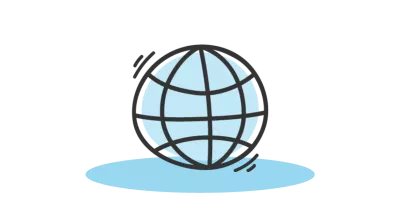
Our programmes

Our strategy

Get involved
Help us tackle the learning crisis.

Skills for a green transition
Solutions for youth on the move

ICTD annual report 2022
Information and Communication Technology Division
Tracking progress on foundational learning
Findings from the RAPID 2023 analysis

Global annual results report 2022: Goal Area 2
Every child, including adolescents, learns and acquires skills for the future
Data and insights

Our research

Our insights

Children call for access to quality climate education
On Earth Day, UNICEF urges governments to empower every child with learning opportunities to be a champion for the planet
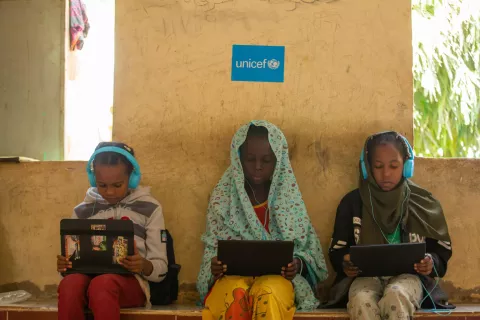
An entire generation of children in Sudan faces a catastrophe as the war enters its second year

Teachers wanted
Empowering teachers at the forefront of the learning crisis
Children and teachers killed in air strikes on schools in eastern Myanmar
Looking for strategies or have questions about how to support your child’s education? Ask our AI-powered assistant.
Parent Resources for Learning > Core Skills > How Early Childhood Education Improves Kids’ Lives
How Early Childhood Education Improves Kids’ Lives
by Dr. Jody Sherman LeVos | May 21, 2024 | Core Skills

When you imagine your child thriving in high school or as an adult, what do you see as the path that brought them there?
Does it start with them collecting rocks on a walk with you now? How about pointing at a picture book and naming emotions? Cooking together in the kitchen?
Their early childhood education—whether it’s what they do in preschool or daycare or what they do at home with you—has important impacts down the road.
Rock collecting can lead to them being more curious in high school. Naming their emotions prepares them to build strong relationships. Cooking can teach them critical thinking and early math skills .
Wonder why, and how you can be an integral part of creating a positive early learning impact on your child? We’ve got some answers for you!
The Short Cut
- Early childhood education, both formal (daycare and preschool) and informal (at home, museum exhibits, library reading hour), is an important part of setting kids up for long-term success
- When kids have high-quality learning experiences in early childhood, especially when combined with secure attachments, they’re more likely to graduate high school, less likely to end up in the criminal justice system, are healthier as adults, and earn more over their lifetimes
- Kids encouraged in Begin’s 5 C’s ( Core Skills , Creativity , Critical Thinking , Curiosity , and Character ) as part of their early childhood learning experiences are more engaged in school and score better in reading and math
- Begin offers a play-based learning membership rooted in the 5 C’s, delivering learning at the right time and in the right way for every child
7 Reasons for the Importance of Early Childhood Education

Offering your child a rich early childhood education gives them the opportunity to fall in love with learning before they go into their first classroom. It also takes advantage of the flexibility of their brain to get them primed for later learning.
Early childhood education is so important that the United Nations recognizes it as a dedicated target in its Sustainable Development Goals . Target 4.2 specifically asks countries to “ensure that, by 2030, all girls and boys have access to quality early childhood development, care and pre-primary education so that they are ready for primary education.”
Some of the biggest reasons early childhood education is important include:
1. Shaping Growing Brains
Children’s brains develop at an astonishing rate between birth and eight years old.
During these years, their brains are changing rapidly. They respond to their environment and experiences with the creation of billions of neural connections.
A rich early childhood education shapes that environment and those experiences in a way that promotes lifelong learning. When kids have healthy, positive, and stimulating early years, it shapes their minds in ways that lead to long-term well-being.
2. Building a Foundation for Literacy and Numeracy
Literacy and numeracy sound like advanced skills—and they can be!—but working on them with even very young kids isn’t outside of your reach.
Activities like reading books to your child and making up stories together are part of literacy preparation. And playing music, doing puzzles, and counting everyday objects as part of your daily routine are precursors to numeracy.
Having those basic pre-writing and early math skills at school entry sets kids up for long-term academic success.
3. Discovering Learning Challenges and Needs
Some kids are naturally drawn to math concepts or fast to pick up the meaning of phonemes . Others emotionally regulate themselves more easily outside than in your home. And many kids struggle with executive functioning (skills like paying attention and following directions) or with aspects of language.
The earlier you begin to identify your child’s particular skills and needs as they relate to learning, the sooner you can help them find opportunities to practice what they’re good at and help them learn how to face challenges. These skills, in turn, help them throughout their lives.
4. Nurturing Social and Emotional Skills

Whenever you’re dressing up and role-playing with your child , taking them to the park to meet peers, or giving them a chance to practice collaborative play at daycare or a playgroup, you’re encouraging your child to develop social skills. This helps them develop meaningful relationships at all ages.
And if you help your child identify and express their feelings , you’re paving the way for better relationships, improved conflict resolution, and empathy.
5. Establishing Secure Relationships
As your child practices their social skills with you, they’ll also be forming relationships with various other people in their life, like friends, teachers, and neighbors. As these relationships grow, your child may begin to feel a sense of safety and develop trust with these people.
Developing these relationships at an early age has far-reaching benefits. If your child feels supported and heard, they can begin to work on skills like cooperation and emotional regulation. These skills make learning in a classroom or community much easier.
6. Developing Good Habits

You can add intentional learning time into your child’s day by incorporating it as part of a routine. So you might make a point to use your bedtime reading ritual to talk about characters and their emotions or how the plot of the story is sequenced. Or you might practice counting while washing hands before dinner.
Kids feel reassured by a routine. It can reduce their anxiety because they know what to expect. It can also inspire them to practice independence. For example, if they know you always go for a walk together after dinner, one evening they may finish eating and rush to their shoes to attempt to put them on by themselves.
7. Instilling a Lifelong Love of Learning
Centering your child’s early learning on having fun will go a long way toward cultivating a passion for exploring new things and gaining knowledge. If they enjoy learning at a young age, they’re likely to stay more open to it as they get older.
Helping your child develop motivation to learn is also an important aspect of early childhood education. If they’ve got the internal drive to explore new ideas and try new things, they’ll go far!
The Importance of Early Childhood Education Outside of the Home

One of the best ways to get a good early childhood education is through quality daycare and preschool.
When they go to a high-quality daycare and preschool, kids build stable relationships, experience safe and stable environments, enjoy nutritious meals, and establish health-promoting behaviors. They also work on emotional well-being and literacy skills, creativity and curiosity, and executive functioning skills—all in a safe and dependable place.
These positive effects matter for all kids! It doesn’t matter if you work full-time and rely on daycare or send your child to preschool part-time because you want them to have more social experiences—high-quality formal early childhood education makes a difference for kids and can improve:
- Cognitive skills
- Social and behavior skills
- Language and math skills
- High school graduation rates
- Chances of not getting involved in the criminal justice system
- Adult health
- Lifelong earnings
Nurturing Early Childhood Education in Your Home

While formal education is helpful, it’s not all that matters. You have an enormous impact on your child’s early education—and you don’t have to follow a curriculum to do it!
As their primary caregiver, you create their first secure bond. This allows them to feel safe in their environment and courageous in their pursuit of what lies outside of it.
Beyond that, because you spend so much time with your child (and they’re so attuned to your interests in their early years), you have lots of chances to help them learn critical skills.
Great learning materials to have on hand include:
- Objects for outdoor play (like sticks, rocks, and shells)
- Toys for outdoor play (like chalk, balls, and bikes)
- Objects for indoor play (like pots and pans, laundry baskets, and tissue boxes)
- Toys for indoor play (like dress-up clothes, blocks, and puzzles)
- Art materials (like paper, tape, and kid-safe markers or paints)
Reading books, cooking, building with blocks, painting a picture, and going on nature scavenger hunts are a few everyday activities that help your child learn important skills. You can also work on:
- Phonemic awareness
- Emotional regulation
- Letter recognition
- Early math
- Sensory activities
- Learning shapes
- Teaching kindness
- Artistic expression
- Naming feelings
And much, much more—all through simple activities and everyday play.
The Begin Approach to Early Childhood Education
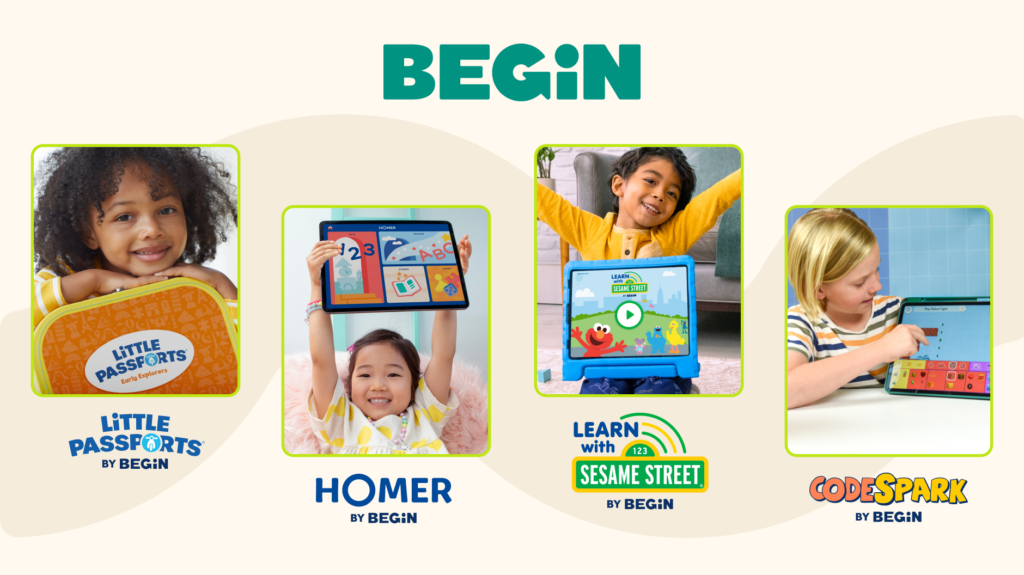
Doing early childhood education at home gives kids a head start when they enter a formal school system. They go into school with core academic and critical thinking skills, curiosity and the confidence to share it, comfort with expressing themselves creatively, and the social skills to build their character.
At Begin, we understand the importance of early childhood education, and we make it easy for parents.
Whether your child is learning with you, a daycare provider, or a teacher, Begin can help you (all of you!) build their capacity for learning. Our age- and stage-matched learning membership supports your child every step of the way.
Take our online quiz today to discover which stage of our membership is best for your family!

Jody has a Ph.D. in Developmental Science and more than a decade of experience in the children’s media and early learning space.
View all posts
Dr. Jody Sherman LeVos
Related posts.

7 Steps to Deal with Temper Tantrums
Don’t worry! Temper tantrums are normal, and you can help your child manage them. Find out how!
Keep Reading →

8 Proven Strategies to Motivate Your Child to Learn
Explore 8 strategies and 3 keys for motivating your child to learn from our experts!
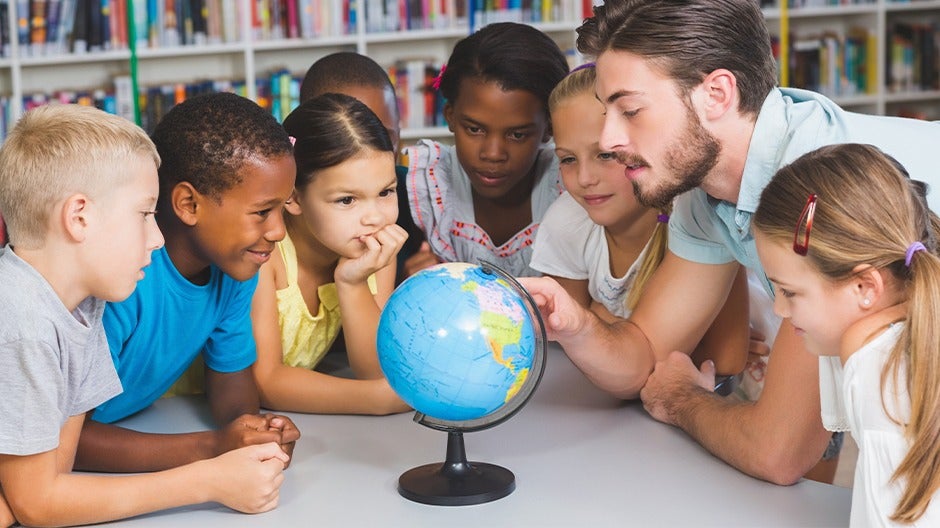
8 Ways to Use Holistic Skill Development to Help Your Whole Child Thrive
Our approach to learning makes a great foundation for holistic skill development. Check out 8 activities you can do at home.

Understanding Your Picky Eater: A List of Foods to Try (and How to Find More)
Many kids are picky eaters. Find out some common reasons why and expand the list of foods your child will eat!

7 Creative, Rewarding Ways to Teach Empathy to Kids at Home
Check out some creative ways to teach empathy to kids, and help your child develop a compassionate mindset as you work on empathy skills.

8 Ways to Raise Confident Kids at Home (for Girls and Boys!)
Confidence helps kids throughout their lives. Try these parenting strategies and activities and start raising confident kids at home!
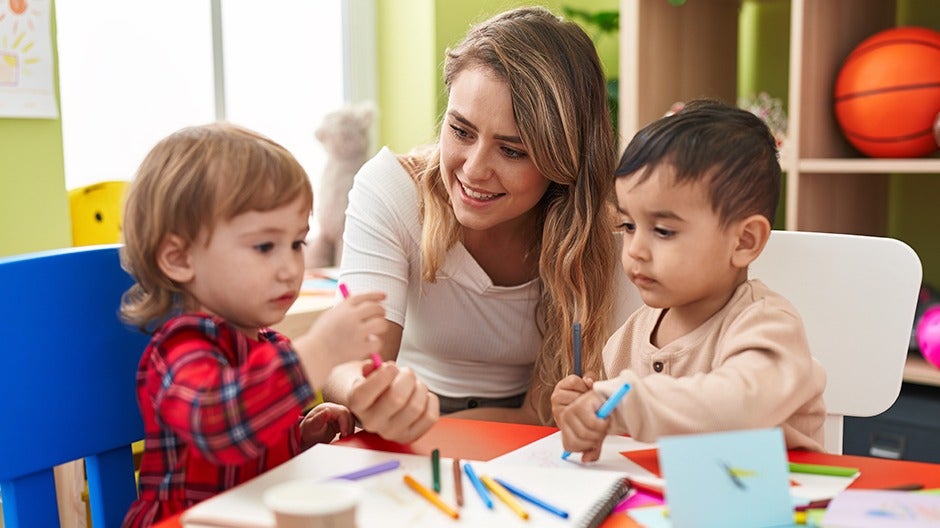
5 Fun Activities to Build Social Skills for Preschoolers
Social skills activities can help your preschooler learn how to interact with the world. Try these five at home!

6 Ways to Make Curiosity-Building Sensory Bottles
Sensory play helps kids build curiosity. Try these six ways to make sensory bottles for your family!

9 Effective Emotional Regulation Activities for Kids in 2024
Emotional regulation is an important skill, but our kids aren’t just born with it. Find out how to teach it to your child!

5 Fun Critical Thinking Games to Play with Your Child
Critical thinking is an essential early learning skill! Check out these 5 games that help kids build it!

Bring Calm to Your Child’s Body with These 8 Breathing Exercises
Even one minute of breathing can reduce stress and anxiety for your child. Check out these exercises to see which might help your child learn how to find calm.
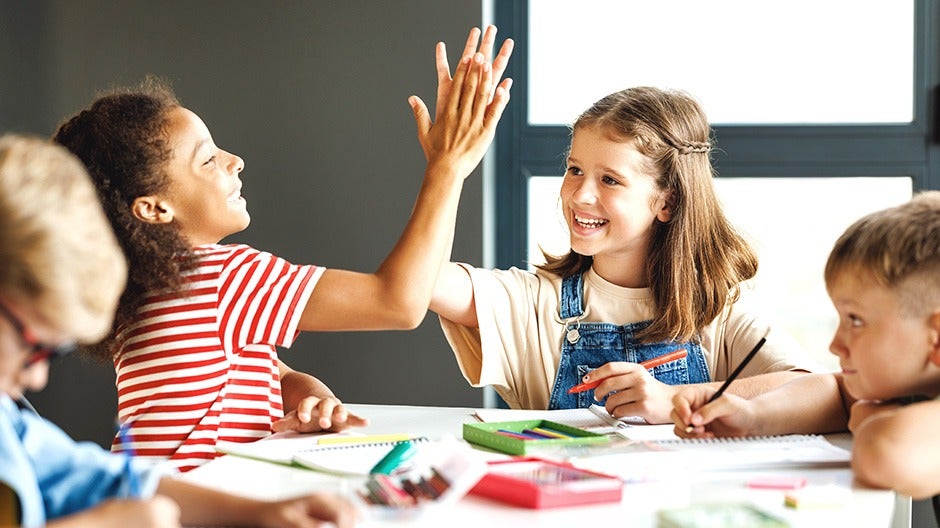
6 Key Goals for Enhancing Social Skills in Children at Home
Social skills are the building blocks of healthy relationships. Find out how to set social skills goals for your child and practice achieving them!
BU Hub Turns Six—and It’s More Important Than Ever
With workers frequently changing jobs and careers, faculty and students reflect on the value and challenges of boston university’s groundbreaking general-education curriculum.
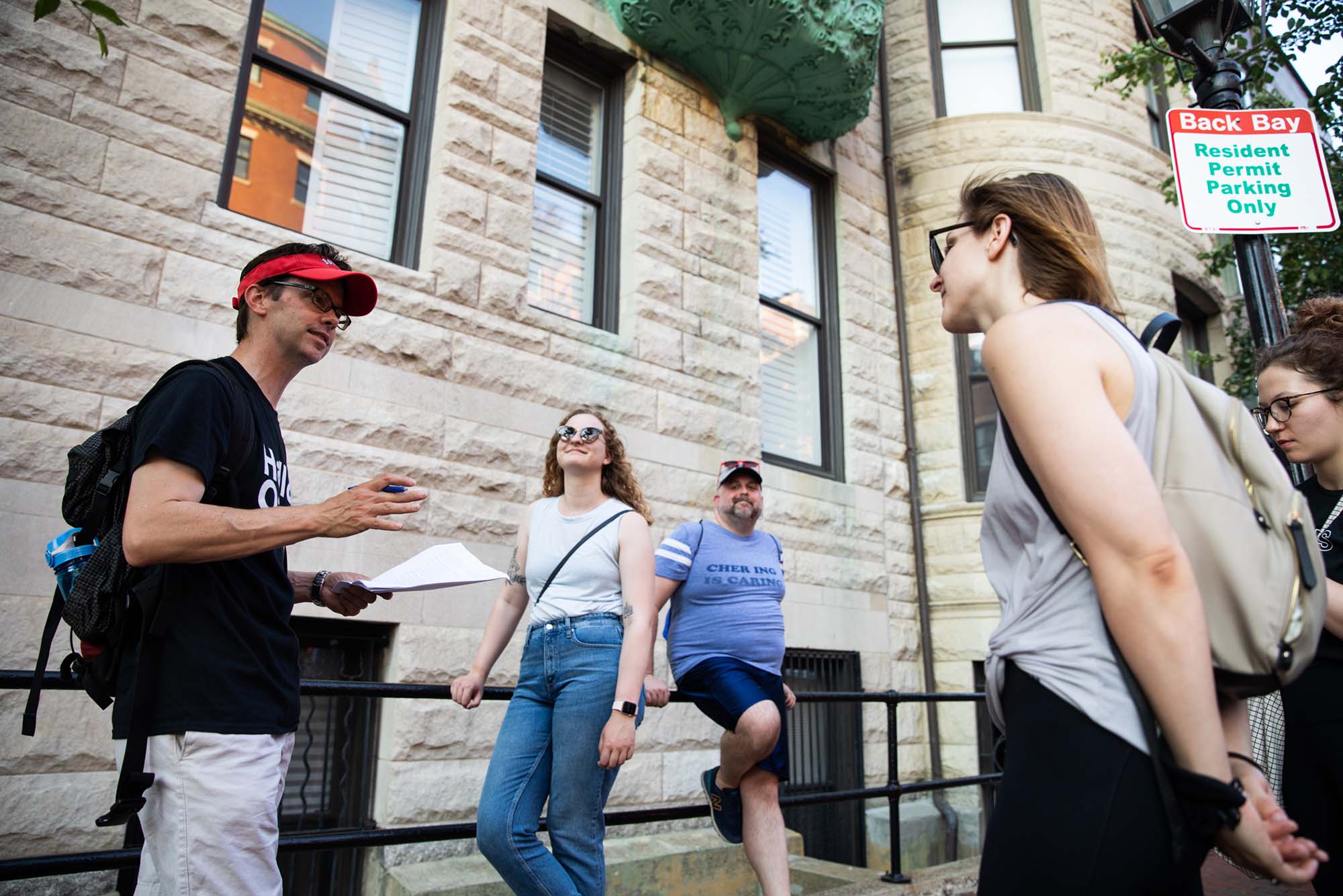
Students in the History of Boston University summer 2021 Hub course taught by Daryl Healea (STH’01, Wheelock’11) (far left) about to embark on a walking tour around Boston to view historical BU locations. Photo by Jake Belcher
Alene Bouranova
Modern Greek Culture and Film. Marine Biology. Introduction to Internet Technologies and Web Programming. History of Boston University. Political Economy in China. Ceramics I.
These are just a selection of the nearly 2,000 classes that qualify for the Boston University Hub , BU’s general-education undergraduate program for all BU undergraduates.
With the days of employees staying with one company for decades, or even a lifetime, long gone , and less than 30 percent of college graduates working in the same field they majored in, experts say it’s more important than ever that workers carry a diverse skill set that’s easily transferable between companies and career paths. Today’s average worker will have 12 jobs in their life, according to The Chronicle of Higher Education .
The Hub, which launched in 2018 and just marked its six-year anniversary, is intended for just this purpose. It’s also marking the inaugural mandatory five-year review period for the first round of Hub courses added to the program.
The Hub combines gen-ed principles—giving students a set of versatile skills they can carry into their careers—with a framework of learning outcomes that can be applied to all fields. That means students have almost limitless options to choose from when meeting their major’s requirements: courses differ widely—from, say, Archaeological Science to Religion and Hip Hop—but that’s precisely what makes the program a standout among higher education institutions.
“When I participate in higher-ed conferences about general education, staff from other universities are always awed by the scale and ambition of what we’ve accomplished,” says David Carballo , a professor of anthropology, archaeology, and Latin American studies in CAS and former assistant provost for general education. Consider: it’s not uncommon for other universities to have general education offerings of around 100 to 200 courses, Carballo says.
That doesn’t mean the Hub is without some obstacles.
Some have complained that the program can be unwieldy and overly complicated. For students who come into BU with no Advanced Placement credits, it can be challenging to fit all 26 Hub requirements into their schedule while also meeting requirements for majors and minors. The same is true for students who switch majors and find themselves with a brand-new set of requirements or for those whose majors don’t have enough overlap with Hub classes.
But in a time when the American public increasingly questions the value of higher education, ensuring that curricula translate to employment outcomes has never been more vital. For schools with mandatory gen-ed requirements, like BU, the pressure is on to give students the best possible background and skill sets that will help them once they graduate and enter the workforce.
Hub administrators are aware of its limitations. They’re also mindful of the larger struggles that plague general education, which is why the Hub is so valuable in today’s economic pipeline, Carballo says: “Our ‘big tent’ approach has challenges for sure, but it provides students with just so much choice and flexibility.”
How the Hub works
The Hub requires students to satisfy 26 requirements across six essential capacities: 1) Philosophical, Aesthetic, and Historical Interpretation, 2) Scientific and Social Inquiry, 3) Quantitative Reasoning, 4) Diversity, Civic Engagement, and Global Citizenship, 5) Communication, and 6) Intellectual Toolkit. Each one has subcategories and those subcategories make up the Hub requirements.
Different courses satisfy different numbers and types of Hub requirements. For example, the course Visual Arts Drawing satisfies both “aesthetic exploration” and “creativity/innovation,” which, respectively, fall under Philosophical, Aesthetic, and Historical Interpretation and Intellectual Toolkit. The Hub structure is laid out here .
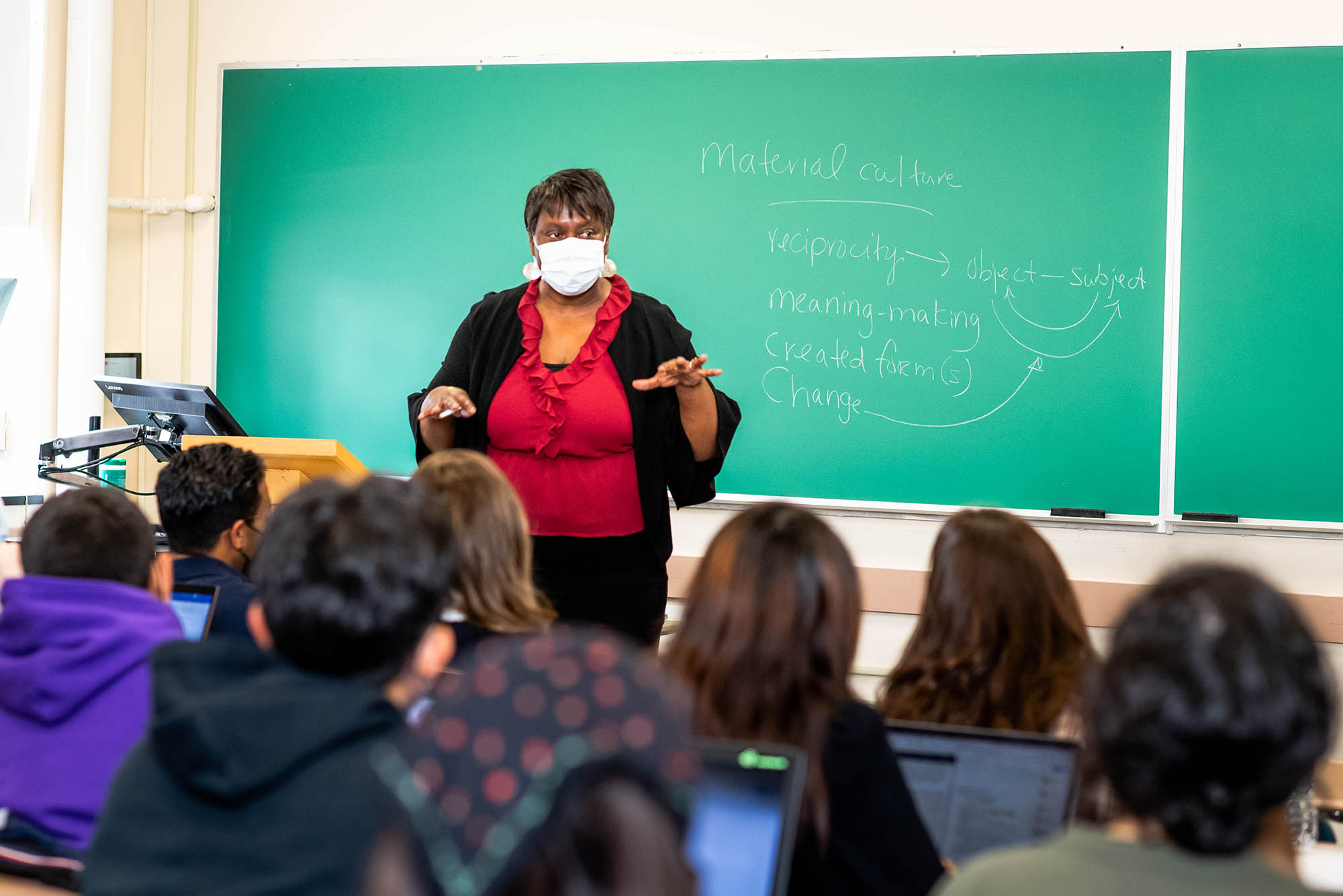
Students are free to choose the courses they want to take. All of BU’s undergraduate schools and colleges offer courses with Hub requirements. Most undergrads are able to satisfy their Hub requirements within 10 to 12 courses, according to the Hub website. Undergraduate transfer students have fewer requirements and meet them within four to five courses.
The Hub also offers a variety of specialty courses , from a two-part introduction to social and racial justice to Cross-College Challenge courses, interdisciplinary electives that put students from different colleges into teams and charge them with solving a real-world problem. And then there are cocurricular courses, or ungraded electives, that focus on a particular Hub area and fulfill one requirement. An example? BU’s Marching Band, which earns members a Hub credit on teamwork and collaboration.
The point of the Hub is to impart a diverse but purposeful knowledge set to students while they earn required credits. The six essential capacities that BU’s General Education Committee settled on blend critical thinking with global and historical awareness, in addition to setting students up with the communication skills they’ll need in the working world.
“Training students to be broad, engaged thinkers, to have transferable skills, and to be good citizens are the three pillars of the program,” Carballo says.
Faculty and the Hub
The Hub isn’t just for students. It also allows flexibility and autonomy for faculty. The Hub isn’t mandatory for professors and lecturers—they have always been free to choose whether or not to participate. Faculty who opt in can incorporate up to three requirements in a course’s curriculum. (Some science labs can fulfill four.) Once a faculty member has a proposed curriculum written out, they submit it to a Hub peer review committee for approval. The committee, comprising fellow faculty members, then reviews and recommends any tweaks.
“What I’ve really appreciated about the Hub is that it requires that we, as instructors, include student-facing explanations for what students are gaining in our courses in terms of knowledge, skills, and habits of mind, rather than only in terms of the class’ content,” says Kathleen Vandenderg , a master lecturer in rhetoric in the College of General Studies and a member of the General Education peer review committee.
Vandenberg teaches two Hub courses in CGS, Rhetoric 103 and Rhetoric 104. Students in those courses can earn three Hub requirements each under the Communication and Intellectual Toolkit capacities (such as “research and information literacy” and “digital multimedia expression”). In naming these student outcomes, Vandenberg says, “we are making salient the many ways in which we understand, interpret, and interact with the past, the present, and the future. And we are identifying different approaches to understanding the world.”
What I’ve really appreciated about the Hub is that it requires that we, as instructors, include student-facing explanations for what students are gaining in our courses in terms of knowledge, skills, and habits of mind, rather than only in terms of the class’ content. Kathleen Vandenderg
“Some students will primarily learn to understand their study and work through data,” she continues, “some through aesthetic experiences, some through the study of primary texts and historical artifacts—these capacities highlight that there are many ways to move through the world intellectually and creatively.”
The Hub evolves
The Hub was designed to constantly evolve, says Lynn O’Brien Hallstein , a CGS professor of rhetoric and current assistant provost for general education.
“The Hub has always been very mindful of responding to student needs,” O’Brien Hallstein says, “in addition to developing new and exciting ways that make it easier for students to earn their requirements.” She says she and her team regularly check in with academic advisors at the schools and colleges, as well as consulting BU Student Government for feedback.
One recurring request from students: “pathways” of curated courses to follow in the Hub. That prompted two curricular pathways for students: social and racial justice and environment and society.
And nothing is set in stone. When the Gen-Ed Committee was established, it built mandatory five-year reviews for Hub courses into the charter. The fall 2023 semester marked the first review. There were 641 courses to review, O’Brien Hallstein says. She and the peer review committee asked faculty members to reflect on their courses and identify what did and didn’t work, and whether or not to change the Hub requirements their course is associated with.
“We really are trying to build in best practices and give faculty the opportunity to think about how a course is working for them, their students, and for major requirements,” O’Brien Hallstein says.
While that can involve a lot of paperwork, faculty say the Hub framework prods them to be better educators.
“Developing a good class that meets the needs of our learners isn’t a given—just because we may be experts in our field doesn’t make us pedagogical experts,” says Sophie Godley (SPH’17), director of undergraduate education in the School of Public Health and a clinical associate professor. “The Hub pushes all of us at BU to be better, and that is a gift to our community.”
Godley teaches several Hub courses, including the Social and Racial Justice advocacy specialty courses. The Hub helps keep her curricula on track, Godley says. “A challenge for anyone teaching in 2024 is the sheer volume of information, knowledge, research, and change that we all—students and faculty alike—encounter on a daily basis,” she says.
“In a field like mine, and with the variety of courses that I am privileged to teach at BU, narrowing down topics, ideas, theories, skills is an ongoing challenge, so that I don’t end up fire-hosing information in class. The Hub capacities allow me to refine and focus my goals, and I appreciate the opportunity to be clear with myself and my students about where we are headed over the course of our time together.”
Students and the Hub
Of course, the real indicator of success is what students have to say about the Hub. For the expected grumblings about having to take required classes, the Hub is largely designed to meet students where they are.
Transfer student Tabitha Fortner (CAS’24) came to BU after spending a year at Bentley University. She was able to meet all of her Hub requirements through the courses required for her psychology major and economics minor.
As a transfer, “BU made it easy for me to fulfill my requirements, 100 percent,” Fortner says. “Psychology is just enough hard science and econ is just enough math—I didn’t have to take anything outside of my major or minor to cover all of the Hub units.”
Students do sometimes have to go out of their way to meet requirements. In that case, the hope is that they at least get something valuable from a course.

As a senior, recent grad Bernice Li (Questrom’24) says, she tried and failed to get into The Mind, Brain, and Self, a Hub course she’d wanted to take since freshman year. “There’s often only one section available for some of the more popular Hub courses,” Li says. Instead, she ended up signing up for Introduction to Communication Writing.
The College of Communication course wasn’t exactly on the business administration major’s radar, but Li says she walked away from it with a tangible skill that should be an asset in the job market. “It definitely helped me improve my technical writing skills,” she says.
In that vein, the Hub can give students a chance to explore disciplines that they may not otherwise experience.
Alum Rebeckah Muratore (Sargent’22, SPH’22) came to BU on a premed track. Then she signed up for the Hub’s Cross-College Challenge pilot.
“The experience completely changed my career trajectory,” Muratore says.
The course charged students with analyzing the proposed merger of the Beth Israel Deaconess and Lahey Health hospital systems. Not only did the class push Muratore to think independently, she says, but it marked her first hands-on exposure to health policy.
“The class introduced me to the importance and excitement of analyzing real-time health policy,” she says. And winning the course’s challenge with her team “gave me the confidence to switch majors and apply to a master’s of public health program to continue that kind of work.”
Now? Muratore has her master’s and works as a health policy analyst at a Bay Area–based data analytics company.
General education, in general
Sure, keeping track of almost 2,000 courses can be a monumental task. As can making sure students check all of their Hub boxes before they graduate.
But both Carballo and O’Brien Hallstein swear by the importance of general education at BU.
First and foremost, they hope that the Hub’s breadth helps prepare students for today’s job market.
“We know that not everyone is going to be working in their major after they graduate,” O’Brien Hallstein says. “Folks need to be nimble and ready to change. That’s one of the real strengths of the program—the way that general education prepares students for what we know happens after Commencement.”
But more than anything, Carballo and O’Brien Hallstein say, they hope the Hub creates a generation of lifelong learners.
“We’re really trying to inculcate in students an engagement in the world,” Carballo says. “If you can find the world interesting, and always find things out there that you want to engage with, life will never be boring. That sort of lifelong learning is a real ethos of the program.
“One way of doing that is not to teach at students, but to make transparent to them the goals for a course, and how they’re going to get there. Showing students those connections, we hope, will keep them interested in the world for the rest of their lives.”
Explore Related Topics:
- Share this story
- 0 Comments Add
Writer/Editor Twitter Profile

Alene Bouranova is a Pacific Northwest native and a BU alum (COM’16). After earning a BS in journalism, she spent four years at Boston magazine writing, copyediting, and managing production for all publications. These days, she covers campus happenings, current events, and more for BU Today . Fun fact: she’s still using her Terrier card from 2013. When she’s not writing about campus, she’s trying to lose her Terrier card so BU will give her a new one. She lives in Cambridge with her plants. Profile
Alene Bouranova can be reached at [email protected]
Comments & Discussion
Boston University moderates comments to facilitate an informed, substantive, civil conversation. Abusive, profane, self-promotional, misleading, incoherent or off-topic comments will be rejected. Moderators are staffed during regular business hours (EST) and can only accept comments written in English. Statistics or facts must include a citation or a link to the citation.
Post a comment. Cancel reply
Your email address will not be published. Required fields are marked *
Latest from BU Today
Pov: schism in the methodist church explained, cfa sculpture class: wearable cardboard sculptures, three bu rowing teams competing for national titles this weekend, leading womanist ethicist and theologian named new mlk professor of religion and black studies at sth, to do today: free dunder-mifflin paint night, can animal organ transplants save thousands of dying people, to do today: knit & crochet night at fenway community center, boston university removes the myles standish name from dorm, pov: remembering charlie pohonich, a final look back at bu’s 151st commencement, how to make the most of memorial day weekend in boston, did you win the free furiosa: a mad max saga tickets for tonight, karen antman stepping down as bu’s medical school dean and medical campus provost, a bu class tackles the massachusetts housing crisis, zesty potato salad, my reflections on the last four years of college: why small life events matter, exploring bu’s vibrant asian student communities for aapi heritage month, photo essay: behind the scenes at a bu commencement, how three class of 2024 grads landed jobs before graduating.
Is college worth it? The answer for half of Americans is striking.

A college degree has often been sold as the key to a higher-quality, affluent life. But a new survey from the Pew Research Center suggests Americans have mixed views about that narrative – and data shows people without degrees have seen their earnings increase in the last decade.
Just 1 in 4 U.S. adults said it was extremely or very important to have a four-year degree if you want a well-paying job in the current economy. Forty percent of respondents said it wasn’t too important or important at all.
Mirroring those trends, just 22% of adults said the cost of getting a bachelor’s is worth it even if it means taking out student loans. Nearly half said the cost is only worth it when students don’t have to go into debt.
Graphics explain: How are college costs adding up these days and how much has tuition risen?
Given trends in the labor and economy – combined with skyrocketing tuition and student debt levels – the lackluster confidence among Americans isn’t surprising. For several decades until about 2014, for example, the earnings for young men without a degree trended downward. But the past decade “has marked a turning point,” according to the Pew analysis.
Workforce participation for these young men has stabilized and their earnings have risen. The share of them living in poverty has also fallen significantly. In 2011, for example, 17% of young men with just a high school diploma were living in poverty; in 2023, that rate dropped to 12%. Young women’s outcomes also improved in recent years.
The changing circumstances help explain why people's mindsets about the value of college have shifted. Roughly half of Americans, according to the Pew report, say a four-year degree is less important today than it was in the past to secure a well-paying job. A smaller percentage – about a third – say it’s more important now.
The skepticism is more pronounced among conservative Americans than people who identify as Democrats or somewhat Democrat. Most Republicans (57%) said it was less important to have a four-year degree. Still, Americans from both parties are more likely to say the importance of a college degree has declined than to say it's increased.
The findings come as the Biden administration works to forgive certain borrowers’ federal student loan debt, which now totals more than $1.6 trillion. On top of barriers to covering tuition, college life has been altered this year by an uptick in culture war tensions on campus, from bans on diversity, equity and inclusion programming to student protests prompted by the Israel-Hamas war. These challenges have fueled debates about whether college is worth it.
Still, the research shows that earnings for degree holders have also trended upward. The income gaps between college graduates and those with just high school degrees or incomplete credentials have persisted.
And while employment prospects for young men without a degree improved in the past decade, their median annual earnings remain below their 1973 adjusted levels.
Financial aid crisis: How FAFSA 'fixes' have turned College Decision Day into chaos
Opinion How geography and religion drive America’s blue vs. red divide
Race and education aren’t the only things driving how Americans vote. They aren’t even the most important.

After Barack Obama’s 2012 victory, political commentators, including some Republicans, fixated on the racial divide. Democrats, they (wrongly) predicted, would win most elections in the future because voters of color were overwhelmingly backing them. The past few years, education has replaced race as the explanation for everything. Journalists and officials in both parties at times speak as if every Democratic voter has a college degree and none of the Republicans do.
But race and education aren’t the only things driving how Americans vote — and arguably aren’t even the most important. Religion, geography and other factors play major roles. Democrats and the broader anti-Trump coalition are too fixated on the education divide and are ignoring everything else.
There is a big split between the nearly 70 percent of American voters who identify as Christians and lean strongly Republican as a group, and the 30 percent who say they aren’t Christians and are much more Democratic, according to polling this cycle and the results from the 2020 and 2022 elections. Another fissure is between those who live in rural areas (very Republican) compared with those in urban ones (very Democratic).
Religion and population density often outweigh race and education in terms of how people vote. White evangelical Christians, even those with college degrees, overwhelmingly vote for Republicans . Asian Americans who are Christian are much more conservative than their non-Christian counterparts . White people without degrees who live in urban areas are significantly more liberal than those in rural areas .

Beyond the urban-rural divide, another geographic factor that is perhaps underappreciated in shaping Americans’ political views is the state they live in. Blue states aren’t just full of atheists, urbanites, minorities and college graduates; red ones aren’t just evangelical Christians, Whites and people without degrees living on farms. States have political cultures and institutions that push people toward certain ideological and partisan views. President Biden’s biggest margin of victory in 2020 was in Vermont, even though it’s one of the Whitest and most rural states .
Age matters, too, largely because voters under 30 tend to be very Democratic-leaning . As does race, mainly because of the huge difference between White voters (about 40 percent back Democrats) and Black ones (more than 80 percent support Democrats.) And there is a growing diploma divide, particularly among White voters . (College graduates are increasingly Democratic, while those without degrees are more Republican.)
A gender gap exists, too. (Women prefer Democrats, men Republicans.) But it’s much smaller than some of the other divides.
The biggest divides and predictors of voting are, of course, ideology and partisanship. Democrats and liberals overwhelmingly support Democratic candidates ; Republicans and conservatives back Republican politicians. But ideology and partisanship are shaped by other factors.
People often become a Democrat or a Republican because that’s what their friends or family are and then adopt the policy views of that party. So getting someone to join a church with lots of right-leaning members might be a more effective way to get them to vote Republican than convincing them of the value of tax cuts for economic growth.
Why does understanding these divides matter? First of all, I worry my industry (the news media) is presenting a flawed view of how people come to their political identities, positions on issues and preferred candidates. The description by many journalists during Obama’s presidency of a monolithic, left-leaning voters of color bloc was overly simplistic. But replacing that with a similarly monolithic frame of right-leaning voters without degrees isn’t any better.
Secondly, I worry those I agree with politically (people opposed to the Republican Party and former president Donald Trump) are misreading the electorate. Both centrist and progressive Democrats have spent much of the past eight years openly discussing their plans to win back the working class, defined as people without bachelor’s degrees. They often publicly brag about initiatives that will create jobs specifically for people who didn’t graduate from college.
I largely agree with those policies. But Democrats aren’t gaining much ground among people without degrees.
There are many reasons for the party’s struggles among these voters, such as continued high prices for some goods and Biden’s age. But I suspect we are also seeing the results of a flawed political analysis and resulting strategy. No one self-identifies as “Jake without a college degree.” There are no institutions or clubs that people join specifically to connect with other noncollege graduates. I doubt most of the 62 percent of American adults without a bachelor’s degree consider themselves part of some collective working class.
Americans do describe themselves as Christians, residents of small towns or, alternatively, people who like to live in urban, walkable areas. Christians congregate in specific places (churches). So do non-Christians (mosques, synagogues). Christians have a set of shared values; so do Muslims and Jewish people. People who prefer cities self-identify as tolerant and inclusive; rural Americans often say they value tightknit communities.
“When it comes to understanding people’s political views and behaviors, their sense of identity is much more important than demographics alone,” said Lauren Goldstein, a pollster at the left-leaning firm Change Research.
I wish the Democratic Party, instead of defining its problem principally as noncollege voters over the last several years, had also tried to appeal to people based on these other identities. There hasn’t been a deep, sustained effort by the party to reduce its margins of defeat in small towns or to develop a rural Democratic identity with corresponding policies.
It’s obviously tricky to appeal to Christians without turning off people of other faiths or violating the principles of separation of church and state. But Obama gave memorable speeches connecting faith and religion to politics and policy. So did Bill Clinton. It’s unclear why Democrats collectively don’t spend more time emphasizing how their policies come from religious values such as charity and forgiveness, even if they aren’t quoting the Bible constantly.
On the flip side, the party could take advantage of the fact that living in a densely populated area and/or not being a Christian tend to make people more likely to vote Democratic. I wrote last year about the potential value of creating church-like institutions for the growing ranks of Americans who aren’t Christians. Perhaps no one would join those. But surely it’s worth people on the left trying to establish new institutions that connect urbanites and nonbelievers with one another, instead of pumping hundreds of millions of dollars into boring TV ads every election cycle.
The speech Obama gave at the Democratic National Convention 20 years ago, in which he downplayed the divide between blue states and red states, was great political strategy but terrible political analysis. We have blue and red states and, really, blue and red people. We are very divided. Understanding the real divides is a key step to addressing them.

- Skip to main content
- Keyboard shortcuts for audio player
Your Health
- Treatments & Tests
- Health Inc.
- Public Health
Why writing by hand beats typing for thinking and learning
Jonathan Lambert

If you're like many digitally savvy Americans, it has likely been a while since you've spent much time writing by hand.
The laborious process of tracing out our thoughts, letter by letter, on the page is becoming a relic of the past in our screen-dominated world, where text messages and thumb-typed grocery lists have replaced handwritten letters and sticky notes. Electronic keyboards offer obvious efficiency benefits that have undoubtedly boosted our productivity — imagine having to write all your emails longhand.
To keep up, many schools are introducing computers as early as preschool, meaning some kids may learn the basics of typing before writing by hand.
But giving up this slower, more tactile way of expressing ourselves may come at a significant cost, according to a growing body of research that's uncovering the surprising cognitive benefits of taking pen to paper, or even stylus to iPad — for both children and adults.
Is this some kind of joke? A school facing shortages starts teaching standup comedy
In kids, studies show that tracing out ABCs, as opposed to typing them, leads to better and longer-lasting recognition and understanding of letters. Writing by hand also improves memory and recall of words, laying down the foundations of literacy and learning. In adults, taking notes by hand during a lecture, instead of typing, can lead to better conceptual understanding of material.
"There's actually some very important things going on during the embodied experience of writing by hand," says Ramesh Balasubramaniam , a neuroscientist at the University of California, Merced. "It has important cognitive benefits."
While those benefits have long been recognized by some (for instance, many authors, including Jennifer Egan and Neil Gaiman , draft their stories by hand to stoke creativity), scientists have only recently started investigating why writing by hand has these effects.
A slew of recent brain imaging research suggests handwriting's power stems from the relative complexity of the process and how it forces different brain systems to work together to reproduce the shapes of letters in our heads onto the page.
Your brain on handwriting
Both handwriting and typing involve moving our hands and fingers to create words on a page. But handwriting, it turns out, requires a lot more fine-tuned coordination between the motor and visual systems. This seems to more deeply engage the brain in ways that support learning.

Shots - Health News
Feeling artsy here's how making art helps your brain.
"Handwriting is probably among the most complex motor skills that the brain is capable of," says Marieke Longcamp , a cognitive neuroscientist at Aix-Marseille Université.
Gripping a pen nimbly enough to write is a complicated task, as it requires your brain to continuously monitor the pressure that each finger exerts on the pen. Then, your motor system has to delicately modify that pressure to re-create each letter of the words in your head on the page.
"Your fingers have to each do something different to produce a recognizable letter," says Sophia Vinci-Booher , an educational neuroscientist at Vanderbilt University. Adding to the complexity, your visual system must continuously process that letter as it's formed. With each stroke, your brain compares the unfolding script with mental models of the letters and words, making adjustments to fingers in real time to create the letters' shapes, says Vinci-Booher.
That's not true for typing.
To type "tap" your fingers don't have to trace out the form of the letters — they just make three relatively simple and uniform movements. In comparison, it takes a lot more brainpower, as well as cross-talk between brain areas, to write than type.
Recent brain imaging studies bolster this idea. A study published in January found that when students write by hand, brain areas involved in motor and visual information processing " sync up " with areas crucial to memory formation, firing at frequencies associated with learning.
"We don't see that [synchronized activity] in typewriting at all," says Audrey van der Meer , a psychologist and study co-author at the Norwegian University of Science and Technology. She suggests that writing by hand is a neurobiologically richer process and that this richness may confer some cognitive benefits.
Other experts agree. "There seems to be something fundamental about engaging your body to produce these shapes," says Robert Wiley , a cognitive psychologist at the University of North Carolina, Greensboro. "It lets you make associations between your body and what you're seeing and hearing," he says, which might give the mind more footholds for accessing a given concept or idea.
Those extra footholds are especially important for learning in kids, but they may give adults a leg up too. Wiley and others worry that ditching handwriting for typing could have serious consequences for how we all learn and think.
What might be lost as handwriting wanes
The clearest consequence of screens and keyboards replacing pen and paper might be on kids' ability to learn the building blocks of literacy — letters.
"Letter recognition in early childhood is actually one of the best predictors of later reading and math attainment," says Vinci-Booher. Her work suggests the process of learning to write letters by hand is crucial for learning to read them.
"When kids write letters, they're just messy," she says. As kids practice writing "A," each iteration is different, and that variability helps solidify their conceptual understanding of the letter.
Research suggests kids learn to recognize letters better when seeing variable handwritten examples, compared with uniform typed examples.
This helps develop areas of the brain used during reading in older children and adults, Vinci-Booher found.
"This could be one of the ways that early experiences actually translate to long-term life outcomes," she says. "These visually demanding, fine motor actions bake in neural communication patterns that are really important for learning later on."
Ditching handwriting instruction could mean that those skills don't get developed as well, which could impair kids' ability to learn down the road.
"If young children are not receiving any handwriting training, which is very good brain stimulation, then their brains simply won't reach their full potential," says van der Meer. "It's scary to think of the potential consequences."
Many states are trying to avoid these risks by mandating cursive instruction. This year, California started requiring elementary school students to learn cursive , and similar bills are moving through state legislatures in several states, including Indiana, Kentucky, South Carolina and Wisconsin. (So far, evidence suggests that it's the writing by hand that matters, not whether it's print or cursive.)
Slowing down and processing information
For adults, one of the main benefits of writing by hand is that it simply forces us to slow down.
During a meeting or lecture, it's possible to type what you're hearing verbatim. But often, "you're not actually processing that information — you're just typing in the blind," says van der Meer. "If you take notes by hand, you can't write everything down," she says.
The relative slowness of the medium forces you to process the information, writing key words or phrases and using drawing or arrows to work through ideas, she says. "You make the information your own," she says, which helps it stick in the brain.
Such connections and integration are still possible when typing, but they need to be made more intentionally. And sometimes, efficiency wins out. "When you're writing a long essay, it's obviously much more practical to use a keyboard," says van der Meer.
Still, given our long history of using our hands to mark meaning in the world, some scientists worry about the more diffuse consequences of offloading our thinking to computers.
"We're foisting a lot of our knowledge, extending our cognition, to other devices, so it's only natural that we've started using these other agents to do our writing for us," says Balasubramaniam.
It's possible that this might free up our minds to do other kinds of hard thinking, he says. Or we might be sacrificing a fundamental process that's crucial for the kinds of immersive cognitive experiences that enable us to learn and think at our full potential.
Balasubramaniam stresses, however, that we don't have to ditch digital tools to harness the power of handwriting. So far, research suggests that scribbling with a stylus on a screen activates the same brain pathways as etching ink on paper. It's the movement that counts, he says, not its final form.
Jonathan Lambert is a Washington, D.C.-based freelance journalist who covers science, health and policy.
- handwriting
Is college worth it? Here's what this national study says
By marjorie cortez, deseret news | posted - may 27, 2024 at 7:02 p.m., byu students enter the marriott center in provo for their commencement ceremony on april 25. a new survey shows 1 in 4 american adults say it's extremely or very important to have a four-year college degree. (laura seitz, deseret news).
Estimated read time: 4-5 minutes
SALT LAKE CITY — Just 1 in 4 American adults say it's extremely or very important to have a four-year college degree to get a well-paying job in today's economy.
Nearly one-third of U.S. adults say the cost of college is not worth it if someone has to take out loans.
These were just two of the findings of a Pew Research Center study that queried more than 5,200 U.S. adults on their views of the value of a college degree. The survey had a 2.1% margin of error.
The online survey, conducted Nov. 27 to Dec. 3, 2023, revealed stark differences in perceptions depending upon political affiliation.
According to survey results made public on Thursday, Republicans and Republican-leaning independents are more likely than Democrats and Democratic leaners to say it's not too or not at all important to have a four-year college degree in order to get a well-paying job, which was the perception of half of the Republican and 30% of Democrats who responded to the survey.
The survey also found that it is "extremely or very likely" that someone without a four-year college degree can get a well-paying job. Forty-two percent of Republican and Republican-leaning independents agreed with that perception, as did 26% of Democrats and Democratic leaners.
Geoffrey Landward, Utah's new Commissioner of Higher Education, during his recent confirmation hearing before a committee of the Utah Senate, extolled the "demonstrated benefits" of higher education.
"I believe that at no other time in higher education's history have we faced such an existential crisis that higher education, long viewed as a pillar of American society and exceptionalism, is now viewed with distrust and it's value doubted, all contrary to objective data," Landward said.
"There isn't a single person in this state who would not benefit from earning a certificate or degree from one of our institutions. Completion of a post-secondary credential is as valuable as ever. Postsecondary education remains strongly correlated with increased job security, lifetime earnings, civic engagement and personal health and happiness," he said.
–Geoffrey Landward, Utah commissioner of higher education
Rising earnings over the past decade — for those with and without college degrees — is another factor that has influenced perceptions of the value of a college degree, according to the report.
"After decades of falling wages, young U.S. workers (ages 25 to 34) without a bachelor's degree have seen their earnings increase over the past 10 years. Their overall wealth has gone up too, and fewer are living in poverty today," the report states.
Over the same period, economic outcomes have also improved for young college graduates.
"As a result, the gap in earnings between young adults with and without a college degree has not narrowed," according to the study.
Survey responses also varied with respect to education attainment.
Thirty percent of college graduates said having a college degree is extremely or very important, compared to 22% of respondents with less education.
The percentage was even higher among postgraduates, with 35% responding that it is extremely or very important to have a four-year college degree in order to get a well-paying job, and 39% saying it's more important to have a college degree today than it was 20 years ago.
Darin Brush, president of Davis Technical College, said the nation's strong and stable economy may also play into perceptions about higher education.
–Darin Brush, Davis Technical College
"Most of our students have not lived through a period where they had to really compete for work. They only know plentiful job opportunities and that changes as we know. Resilience, in so many ways, depends on your credentials and your skills. Finishing that credential and certificate, finishing that degree we know also leads to greater resilience in the economy and longer and better attachment," he said.
The college strongly encourages students who earn certificates and credentials to further their education at Weber State University. A student who trains to become a licensed electrician can earn a handsome living but also obtaining an associate degree would give them the skills they need to start their own successful business, Brush said.
Brush said he is a firm believer in higher education because he knows how earning undergraduate and graduate degrees opened doors in his career.
"I wouldn't be here if I didn't have that. I wouldn't be in a position to do the work I'm doing if I hadn't learned about the world and learned some things that you can only get, I fundamentally believe, you can only get through pursuit of a degree," he said.
Most recent Education stories
- Utah Education Association files lawsuit against school choice scholarship program
National Spelling Bee competitors try to address weaknesses, including 'super short, tricky words'
Community treks nearly 5 miles to advocate for west-side high school in salt lake city, related topics.

More stories you may be interested in

Utah 7th grader helps friend cross the finish line of school race

Biden administration canceling student loans for another 160,000 borrowers

Bringing 'disagree better' home: Teaching kids to negotiate instead of fight
Most viewed.
- Ryan Smith says Utah NHL team name voting is down to 4
- Charges: Salt Lake man, 78, kidnapped, sexually assaulted teen walking home from school
- Nevada roadways slick with crushed Mormon crickets causing crashes
- Orem homeowner fears larger fire was possible after group lit small fires in his yard
- Get Gephardt helps Utahn who says confusing signs led to towing woes
- Coach of Utah women's football team charged with sexually assaulting player
- Japan's Toyota puts hopes in compact engine that runs on biofuels
- 16-year-old stabbed to death in Herriman, police say
- Man arrested, accused of shooting, killing man in west Salt Lake City
STAY IN THE KNOW

KSL Weather Forecast


IMAGES
VIDEO
COMMENTS
In India, Article 21 A of the Constitution states that all children from ages six to fourteen should be provided with free and compulsory education and also reserves the right to education as a Fundamental Right. Article on the Importance of Education: If you are seeking some help to get people to understand the importance of education, this ...
We just need to be clear on terms. There are a few terms that are often confused or used interchangeably—"learning," "education," "training," and "school"—but there are important differences between them. Learning is the process of acquiring new skills and understanding. Education is an organized system of learning.
Nelson Mandela famously said, "Education is the most powerful weapon which you can use to change the world.". An educated society is better equipped to tackle the challenges that face modern America, including: Climate change. Social justice. Economic inequality.
The importance of education lies in its continuity, learning is a lifetime process that will stop with our death. It is the foundation for the development of a healthy individual and society. Our world cannot have a bright future if our culture lacks education. Education is the key to change.
6. A Safer World. Education is something that's not only needed on a personal level, but also on a global level, as it's something that keeps our world safe and makes it a more peaceful place. Education tends to teach people the difference between right and wrong, and can help people stay out of risky situations. 7.
Education is important because it opens up job prospects, encourages brain development, teaches life skills and increases likelihood of financial security among many other reasons. Let's dive deeper into why is education so important, and discuss the reasons we celebrate educators.
Transforming education requires a significant increase in investment in quality education, a strong foundation in comprehensive early childhood development and education, and must be underpinned by strong political commitment, sound planning, and a robust evidence base. Learning and skills for life, work and sustainable development.
Education is a weapon to improve one's life. It is probably the most important tool to change one's life. Education for a child begins at home. It is a lifelong process that ends with death. Education certainly determines the quality of an individual's life. Education improves one's knowledge, skills and develops the personality and ...
Generally speaking, they all tie closely to a person's goals in life and to their future well-being. Below are some of the other most common reasons education is so important: Education helps a person hone their communication skills by learning how to read, write, speak and listen. Education develops critical thinking.
Our most popular education articles of 2019 explore how children develop purpose, how we can best support our students' mental health and social-emotional development, why we benefit from listening to each other's stories, and more. And…if you want to put the scientific findings from these articles into practice, check out our new website ...
The right to education. Every human being has the right to quality education and lifelong learning opportunities. Education is a basic human right that works to raise men and women out of poverty, level inequalities and ensure sustainable development. But worldwide 244 million children and youth are still out of school for social, economic and ...
A girl and a woman in Burkina Faso.An Afghan refugee family in Greece.A teacher in India.An entrepreneur in Guatemala.. These are the stories on the power of education currently featured in an immersive exhibition entitled "Education transforms lives" that UNESCO has set up at the United Nations Headquarters in New York on the sidelines of the High-level Political Forum.
The Importance of Education. Education is an important issue in one's life. It is the key to success in the future, and t o. have many opportunities in our life. Education has many advantages ...
Martin Luther King, Jr. identified "the goal of true education" to be "intelligence plus character." Schools that do well in terms of test scores don't always excel at developing character in ...
Education is a right for everyone. It is a right for girls, just as it is for boys. It is a right for disabled children, just as it is for everyone else. It is a right for the 37 million out-of-school children and youth in countries affected by crises and conflicts. Education is a right regardless of where you are born and where you grow up.
Transforming education to change our world. UNESCO provides global and regional leadership on all aspects of education from pre-school to higher education and throughout life. It works through its Member States and brings together governments, the private sector and civil society to strengthen education systems worldwide in order to deliver ...
Educators' values and beliefs. A distinction between teacher training and teacher education is that teacher training is the acquisition of competencies pre-determined by others - knowing what a teacher does, and how to do it - whereas teacher education is about understanding why teacher do what they do: the rationale. As Craft (Citation 1984) observed, this distinction resonates with the ...
Philosophy of education is the branch of applied or practical philosophy concerned with the nature and aims of education and the philosophical problems arising from educational theory and practice. Because that practice is ubiquitous in and across human societies, its social and individual manifestations so varied, and its influence so profound ...
3. Build Confidence. Education, and the knowledge about the world that it provides you, provides a huge draw of confidence. A confident child is one that can benefit in many aspects of life. In education, they have the confidence to express themselves or ask for help or clarification if they need it.
Quality education reduces poverty. If all children in low-income countries left school able to read, global poverty would fall by 12 %. 1 If all adults completed secondary education, 420 million people could be lifted out of poverty, reducing the total number of poor people by more than half worldwide. 2 An extra year of school can increase men's income by at least 10 %, women's income by at ...
Development education, education for sustainable development and global citizenship education. More than a century ago, Durkheim (Citation 1885, 445) declared that the 'aim of public education is not 'a matter of training workers for the factory or accountants for the warehouse but citizens for society'.From a US perspective, Feinberg (Citation 2006, xi) draws attention to the 'shared ...
Making writing a part of reading instruction further enhances how well students read ( Graham, Liu, Aitken, et al., 2018 ). In essence, students are unlikely to maximize their growth in other school subjects if writing is notably absent. Writing is equally important to students' future success.
Education in emergencies: Children living through conflict, natural disaster and displacement are in urgent need of educational support. Crises not only halt children's learning but also roll back their gains. In many emergencies, UNICEF is the largest provider of educational support throughout humanitarian response, working with UNHCR, WFP ...
A rich early childhood education shapes that environment and those experiences in a way that promotes lifelong learning. When kids have healthy, positive, and stimulating early years, it shapes their minds in ways that lead to long-term well-being. 2. Building a Foundation for Literacy and Numeracy.
The Hub requires students to satisfy 26 requirements across six essential capacities: 1) Philosophical, Aesthetic, and Historical Interpretation, 2) Scientific and Social Inquiry, 3) Quantitative Reasoning, 4) Diversity, Civic Engagement, and Global Citizenship, 5) Communication, and 6) Intellectual Toolkit.
Most Republicans (57%) said it was less important to have a four-year degree. Still, Americans from both parties are more likely to say the importance of a college degree has declined than to say ...
The lack of medical education on this topic and resulting weak clinical knowledge of ME/CFS has resulted in delays to diagnosis, multiple clinic referrals and a huge cost to every taxpayer. ME/CFS costs the UK an estimated £3.3 billion a year 6 and long COVID clinics cost millions, with funding being extended for this chronic condition.
6 min. 0. After Barack Obama's 2012 victory, political commentators, including some Republicans, fixated on the racial divide. Democrats, they (wrongly) predicted, would win most elections in ...
As schools reconsider cursive, research homes in on handwriting's brain benefits : Shots - Health News Researchers are learning that handwriting engages the brain in ways typing can't match ...
Nearly one-third of U.S. adults say the cost of college is not worth it if someone has to take out loans. These were just two of the findings of a Pew Research Center study that queried more than ...